

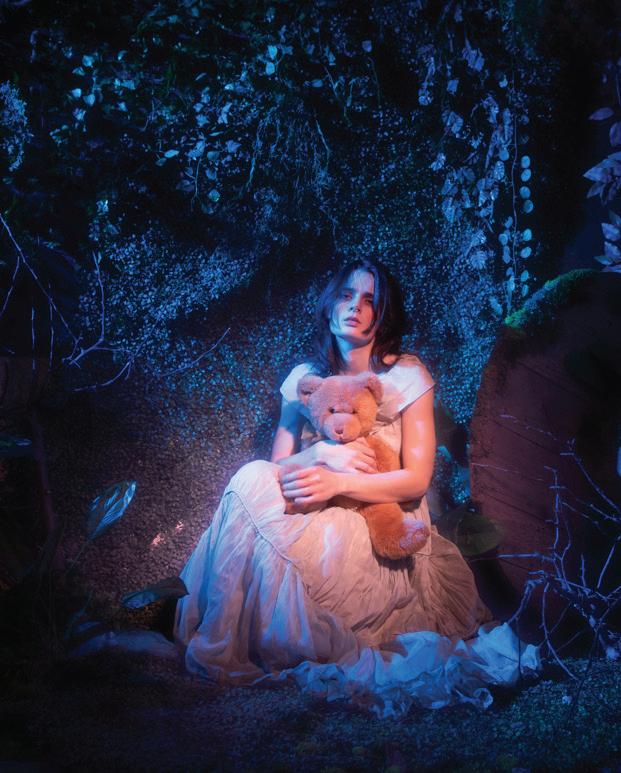

Find works from 24 different creatives from around the world ranging from art, fiction, poetry, nonfiction, film, and plays
Issue 7 | Winter
Art | Fiction | Poetry| Plays| Screenplays | Films | Interviews
©
2024 by Chaotic Merge Magazine. All Rights Reserved. All rights to all original artwork, photography, and written works belongs to the respective owners as stated in the attributions. Without limiting the rights under copyright reserved above, no part of this publication may be reproduced, stored in or introduced into a retrieval system or transmitted in any means (electronic, mechanical, photocopying, recording, or otherwise) without the prior written permission of both the copyright owner and publisher.
TABLE OF CONTENTS FICTION POETRY 5 43 61 ARE THERE STARS AT THE END OF THE WORLD by Jennifer Stark SWEET BOY LOOKING OUT by Kenneth Gulotta ENGLISH LEATHER by Kevin B. NONFICTION 20 31 GIVE ME MY SIN AGAIN by J. Alan Nelson LATE SUMMER'S EVE, EVE by Sam Moe 1 2 9 10 27 53 SOFIA by Mia Alexander A FEAST AMONG COUSINS by Susan Muth VILLANELLE FOR THE WEARY by Susan Muth
turned
a marriage proposal. by Mia Alexander i'm starting to think we should move here by Aïcha Martine Thiam MOTHERLAND by Hannah Cruz 55 67 identity by Paula Maseda to him i'm porn where i should be art by Paula Maseda LAUNDERED by Angela Townsend 57 85 MISS STALLION by Beto Huerta OLD SOUL by Jacqueline Morgan 96 ON A NIGHT WHEN THE CITY WAS SICK by Julia Rapp 81 searching for light in the solis lacus by Shannon Dunn 82
I
down
91
93
4
CASTLE
29
BREAKFAST

11 ARRAY OF THOUGHTS, WHILE AT CONFESSION by
1987 HONDA CIVIC HATCHBACK by
Hannah Cruz A
Layli Rohani
EVERYONE I LOVE IS TURNING INTO SOUP by
by
Rossetter
BRIDGE by
Hannah Greenberg
by
83 90
101 IN BUILT SPACE 2 by
BUILT SPACE 1 by
BUILT SPACE 4 by
71 102
Kolin Lawler FORE!
Kathryn
ART 3 66 LITTLE
KJ
SIREN
Abby Behrens 69
92 95
Jaina Cipriano IN
Jaina Cipriano IN
Jaina Cipriano
by
Relief by
by
Emily Millán Bousha
Zoe Stanek PHOTOGRAPH
Jaina Cipriano
IN BUILT SPACE 3
Jaina Cipriano
FALLEN ANGEL 2 by
by
54
Abby Behrens PLAWRITING COVER ART
1 by
IN BUILT SPACE
Jaina Cipriano
FOLLOW US ON OUR SOCIALS
WATERS
3 QUIET
by KJ Hannah Greenberg
7
BRIDGE 2
4 7 BRIDGE
by KJ Hannah Greenberg ALPINE
by KJ Hannah Greenberg
FOR TWO
by Zoe Stanek
ODE TO THE HALLOWEEN MONSTER by
Stella Gleitsman
by
54 FALLEN ANGEL
Abby Behrens
OUR EDITORS LETTER FROM THE EDITORS
EDITOR IN CHIEF
Jasmine Ferrufino
FICTION MANAGING EDITOR
Mason Martinez
POETRY MANAGING EDITOR
Britt Trachtenberg
NONFICTION MANAGING EDITOR
Emily Townsend
FICTION EDITORS
Lassiter Jamison
Isha Jain
Audrey T. Carroll
Kylie Yockey
NONFICTION EDITORS
Tabatha Miller
Christopher Barton
Andrew Gills
POETRY EDITORS
Ali Van Glad
Ayla Marsden
Kirry Kaufer
Sarah Lawless
PLAYWRITING/SCREENWRITING EDITOR
Bailey Peabody
Hi Everyone! It's Jasmine here! In the last issue, you heard from our wonderful Managing Poetry Editor, Britt Trachtenberg. For this issue, we'd like to introduce you to our lovely Nonfiction Editor, Emily Townsend. From the moment Emily joined Chaotic Merge, I could feel her pure passion for Nonfiction, and it spread to me and into the team. She has brought joy, laughter, and of course, her incredible editing skills. I can't wait to meet her in person soon (hopefully at her wedding) because she truly brought so much joy to this team. So with that, Emily, take it away.
Hi readers!
Our seventh issue cover by Jaina Cipriano speaks for the spectacular works presented—loss of childhood innocence, relationships cut short by unexpected absences, wondering if there are other things far beyond our scope. The poetry tinges in sadness and nostalgia of vignetted memories; the plays reflect on community, solitude, and grief. Offering a comedic relief, the essays detail the mad rush home for a potty break, only to accidentally crack and suddenly need to use a dorm’s laundry room for the first time; having an existential crisis over seeing Y2K nostalgia as a clothing trend in Forever 21. Scent runs rampant in prose, old English leather and lemons, vanilla cigars and floral notes of roses and moss. Each piece by these incredible creatives lives rent free in my brain. We truly enjoyed working with our writers and artists and are proud to showcase their talents, and we know you will enjoy them, too.
Best,
Emily Townsend Nonfiction Managing Editor
Sofia by Mia
Alexander
She has a taxidermied rabbit head on the left corner of her shelf & reads Ginsberg splayed out on her dorm room floor.
Saturday we watched Moonlight, intertwined on the skin of her loveseat. I couldn’t unclip her bra & she laughed
& I liked the sound so much, I kissed her squarely on the mouth. Her breath tasted like cinnamon.
Once, I swore her skin was moonlight. I ran my fingers over the small of her back & held her tighter when a fruit vendor called us Dykes.
1 | Issue 7
A Feast Among Cousins
by Susan Muth
In the shade of a blackberry bush, our lips stained, we must have looked starved to any passersby for how ferociously we sifted through leaf after leaf.
In the late July sun, we tried not to think of what waited for us back at the house—uncles and aunts chain-smoking on the back porch, wishing it was something harder, our grandfather keeping an eye on the sliding door to make sure no one wasted the AC, everyone drinking, vying for a chance to start the first family fight—if not with fists with minds too hazy to make any sense.
So, we continued our feast, felt the sun stream in between oaks as if shining in through parted curtains.
Winter | 2


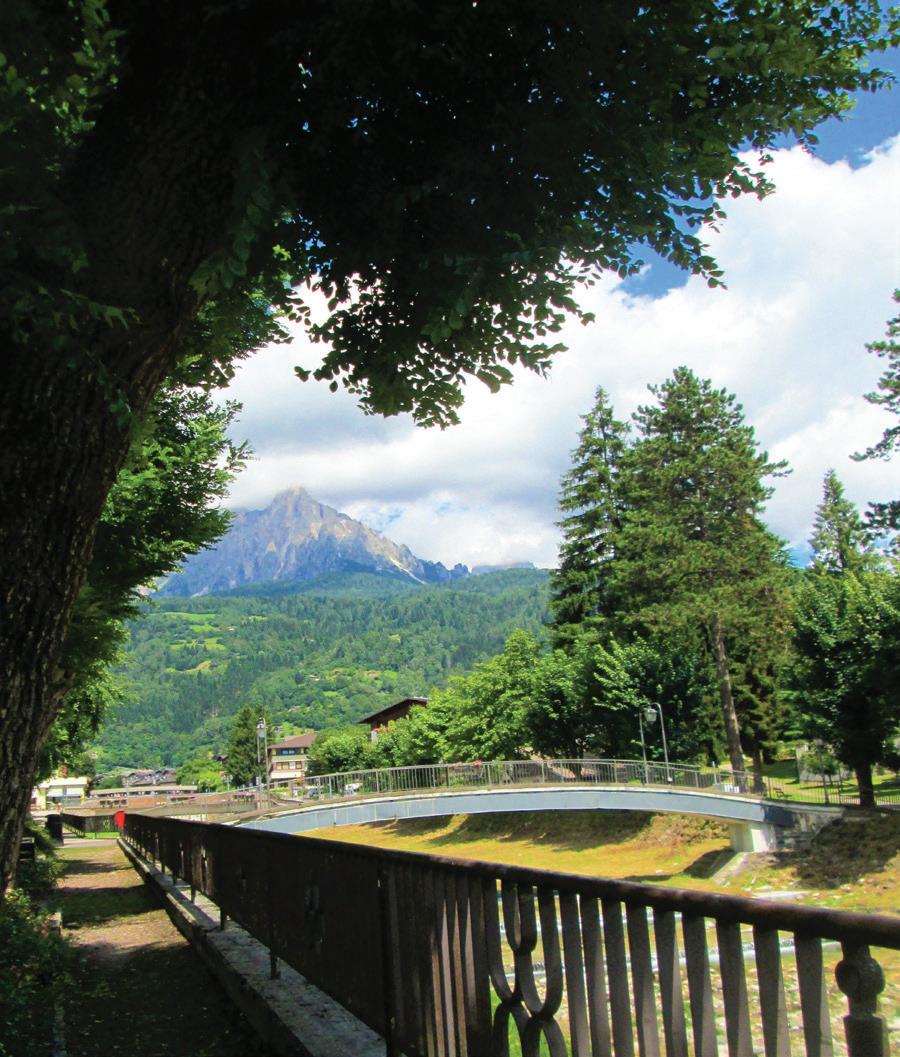
3 | Issue 7



Winter | 4
Are There Stars at the End of the World? by Jennifer Stark
These are the places I know: the ridge, then the slope, then the slope all the way down to the water. You can only see the water from up here on certain days, but I know it’s there even when we can’t see it. When we scrabble down the slope, it eventually comes into view, and then we can see it licking the land, its waves small now. The haze covers the rest.
On bad days, we can barely see each other – the smoke reaches us even up here on the ridge and those are the days I can barely breathe; when I’ll wish my great-grandparents had died back in the first wave, that they hadn’t been so goddamn stubborn and refused to give up despite it all. Thoughts like that only find me on bad days though – some days you can see all the way down to the water from here.
When I was a kid, they’d tell us stories about before –about things called wheat fields, and meadows, and beaches. They’d say it was important for us to know that these things existed, once. You could tell when they talked that they really loved these places, the way their faces changed in the telling. Now, when I ask them to describe them to me again, they refuse. What use is it telling you about things like that, they say, and so I just try to remember what they told me when I was younger, but their descriptions were so abstract that I could barely grasp them even then. When I was a little kid I once lost my favourite toy in the stream. It was an accident. It was made of wood, sometime long ago, and it had a faded face you could barely make out, but still I loved it. We looked for it for days but never found it again. It felt sad, knowing I’d never have it again, so I try to remember that feeling and not ask them too often about beaches.
Lately, standing up on the tallest part of the ridge, some
5 | Issue 7
of the others have sworn they can see further than they ever have before, but I think they’re just wishing.
Some nights, when the smoke’s not so bad, a few of us gather on the tallest part of the ridge and perch there, looking out as far as we can see all around us, waiting for the light to leave completely, waiting for the dark. As the light goes, we giggle into our hands, trying to scare each other, jumping at the slightest noise, waiting to see how long we can all last until finally we give in and strike the flint to a torch. Every time we play this game, we try to go for longer.
Last time we played the game, we saw something we’d never seen before – far out, beyond the edge of our ridge, or even the next one. Like someone striking a flint before we did, somewhere way out there. I imagined another group of kids maybe, giggling into their hands, trying to stay quiet. They’d have names too, like we have names. We stayed quiet, watching it for as long as we could keep our eyes open. By morning, we woke cold and sore and it was gone, replaced by a spot where we guessed the sky should have been, but the smoke had come back thick overnight, covering the ridge again.
On bad days I can’t breathe and we can barely see each other, but now those days are also filled with talk about what that pinprick of light in the dark could have been, and if we’ll ever get to see it again. We all pointed to the spot where we had seen it. Didn’t we ever tell you about stars? the oldest ones wondered. They tell us people once saw lights like these every night, often many, and that the light came from something far away that was struck hundreds or even thousands of years ago. We notice some of them rolling their eyes at this. I briefly imagine leaving our ridge and crossing the water and walking to the spot where the light was and finding myself standing thousands of years ago. I know what I’d do first – I’d ask the stars to take me to a beach.
It can’t be what they mean, not really, because if it was surely we would’ve tried to get to the next ridge or the one after long ago. So what? A person can wish, right? Even though we’re older now, their descriptions are still so abstract that we can barely grasp them – but what I do know is that the next time the smoke fades and we stand up on the ridge as it gets dark, there’s no way we’re gonna be the ones to strike our flint first.
Winter | 6
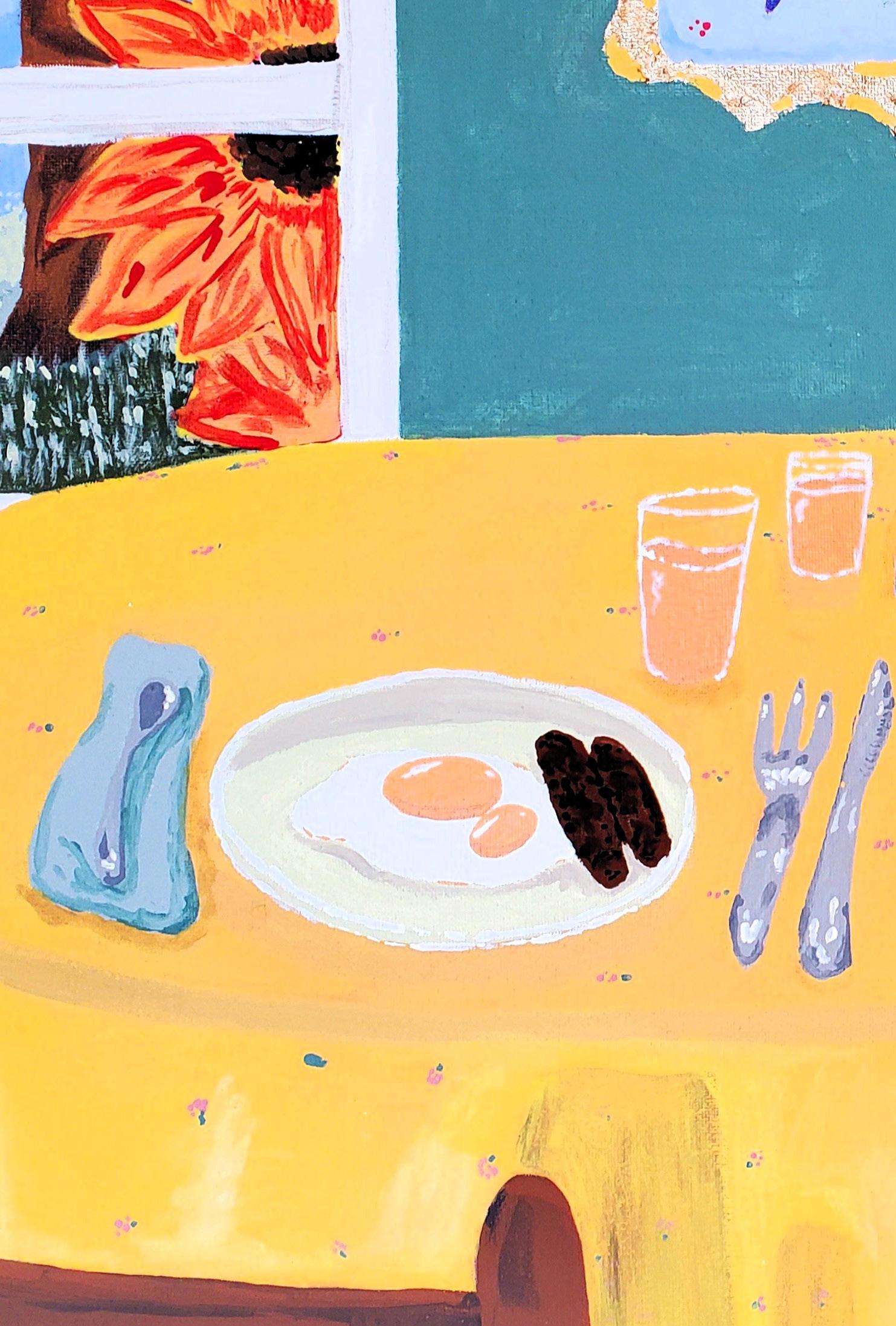
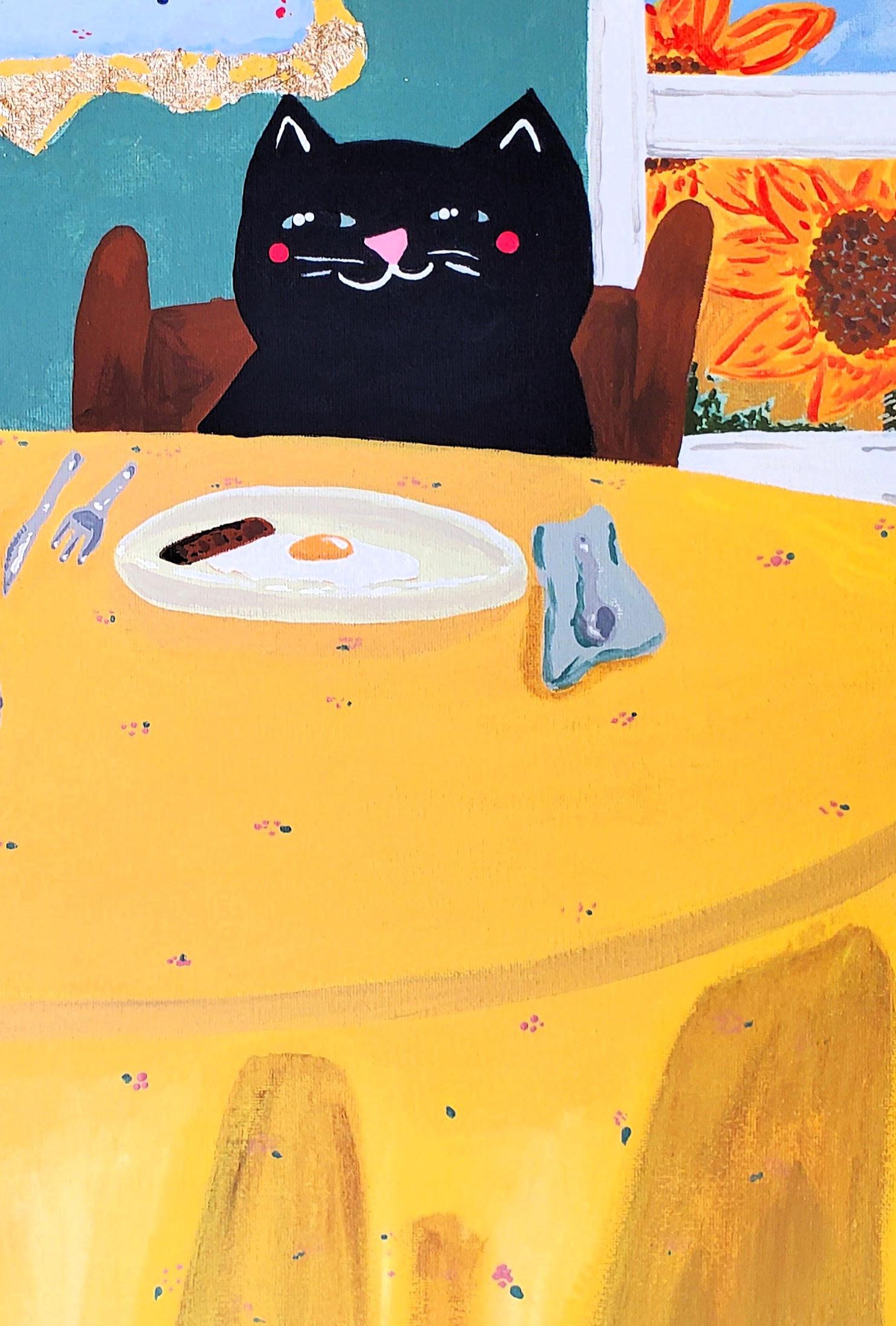
Villanelle for the Weary by Susan Muth
When I ask my grandmother about her childhood she starts with the end attempting to mend some broken, tired thing.
In a bomb shelter in Cambridge, air raids raged.
When I ask my grandmother about her childhood,
she grew tired of dusted over death, snuck out with a steel pot over her head, attempting to mend something broken.
She yearned for the sunlight, marched outside with a ladle as her sword.
When I ask my grandmother about her childhood,
she says she ran up the bunker stairs to smell the sweet earth and rubble, attempting to mend some broken, tired thing.
But only after did she feel rain drops ricochet off metal, when I ask my grandmother about her childhood, she was tired of fearing the broken.
9 | Issue 7
I turned down a marriage proposal.
by Mia Alexander
On the A train, he called me pathetic. He is right, I am living on subway poetry and the pack of cigarettes I stole from a sleeping beggar. Old man,
I might have married you if you hadn’t smelled like sweat, grasping the sleeve of my knit sweater spluttering if we don't believe in freedom of expression for people we despise, we don't believe in it at all. Old man,
I had Masters of Mankind tucked underneath my pillow. If you hadn’t tried to pass off Chomsky as your own I would have married you if anything mattered,
or if my mother passed down her wedding dress before she stopped loving me.
Winter | 10
A 1987 Honda Civic Hatchback
by Layli Rohani
CHARACTERS
Stew……………chatty
Johnny…………quiet
Narrator………..Rod Serling type
SETTING
A busy restaurant in the middle of January during a thunderstorm
A noisy, crowded restaurant. JOHNNY sits alone in the middle of a long table. It is raining.
The NARRATOR, dressed as a maitre’d, enters with STEW.
STEW
Oh, there’s a spot there. Do you mind?
The NARRATOR shakes their head. STEW sits next to JOHNNY.
STEW
Hey there, how’s your night going?
Thunder.
JOHNNY doesn’t respond.
STEW
Not much of a talker, are ya?
JOHNNY immediately gets up and sits at the far end of the table.
The maitre’d brings them both a plate of chicken and places it on the table in front of them.
11 | Issue 7
Score.
STEW
Simultaneously, STEW and JOHNNY both pick up their respective forks, stab at a piece of chicken, and plop it into their mouths, and begin to chew.
They freeze. The rain and thunder stop as NARRATOR enters.
NARRATOR
Stew and Johnny are as much alike as they are different. For example, at exactly 5:37 pm on Wednesday the 21st of January, each entered the restaurant and were consequently seated at the same table. They each ordered the same dish and ate it in the same way, at the same time.
NARRATOR exits. The rain and thunder resume.
STEW and JOHNNY continue eating their food in the exact same way. They each pick up their respective forks again, but this time STEW drops his.
STEW
Shit.
Y’good?
JOHNNY
STEW
Yeah, don’t mind me. Just being a clumsy-fingers over here.
STEW picks up the fork.
JOHNNY I’ve never dropped anything in my life.
STEW
Yet.
Beat.
STEW Stew.
Winter | 12
JOHNNY
(with his mouth full) I got the chicken.
STEW
No, my name. Is Stew.
JOHNNY (mouth still full) Why?
The scene freezes. NARRATOR pops his head in.
NARRATOR
But here is the main reason they differ: Johnny is a dick. NARRATOR exits, the scene resumes.
STEW
I…well…I don’t know. I didn’t think it was that weird.
JOHNNY
You’re named after a food.
STEW
Well as of now you have no name at all, so I think I come out ahead here.
JOHNNY
Johnny.
Ah. Well, Johnny, it’s–
STEW
JOHNNY grunts.
STEW ...to meet you. I ordered the chicken too.
JOHNNY Right.
STEW
Why are you eating alone?
JOHNNY
Because I don’t want to be eating with someone else.
13 | Issue 7
STEW
Or is it because you have no one else to eat with?
A large lightning strike followed by a loud clap of thunder throws the restaurant into darkness.
The NARRATOR, dressed as the maitre’d, returns to their table with a candle.
NARRATOR
Excuse me, we’re asking all patrons to move closer in, these candles are our only source of light for the time being. So let’s just…scootch, scootch, scootch–
JOHNNY begrudgingly seats himself next to STEW.
NARRATOR
There you go, thank you.
The NARRATOR exits.
STEW
You know, sometimes I think loneliness creeps up the most when we’re surrounded by people.
JOHNNY
That doesn’t make any sense.
STEW
Think about it. You can be by yourself and totally fine, but the second you see other people together and connecting, you realize you want that. And that’s all loneliness is really, a longing for something you don’t have.
JOHNNY
Is it now?
I think so, anyway.
Well how ‘bout that.
STEW
JOHNNY
STEW
After my dog, Rufus, died I thought I was ok, y’know? Like, I grieved for a bit, but I got used to the new routine without him. But then I was on a walk one morning and I saw a dog that looked just like him and I just started bawling. Like, just
Winter | 14
crying in the middle of the street–out of nowhere! And I realized…I was lonely. I didn’t just miss him, I missed his presence.
JOHNNY
Fascinating.
Have you ever had a dog?
STEW
JOHNNY No.
STEW
Have you ever wanted to have a dog?
JOHNNY No.
The scene freezes. The NARRATOR enters.
NARRATOR
Ever since Johnny was little, he wanted a dalmatian with a red collar named 1987 Honda Civic Hatchback because he thought it was funny to name a dog known for one type of car after a completely different kind of car. Johnny isn’t very funny.
NARRATOR exits, the scene resumes.
STEW
Right. I never wanted a dog either.
STEW winks at JOHNNY.
JOHNNY Ok.
STEW
How often do you come here?
Do you always talk in questions?
JOHNNY
STEW
How else am I supposed to get to know my dining buddy?
JOHNNY
Yeah, that’s a yes. I’m not your dining buddy.
15 | Issue 7
STEW
Sure you are. You’re eating. I’m eating. We’re chatting–
JOHNNY
This isn’t chatting.
Well then what would you call it?
A nightmare.
STEW
JOHNNY
Another loud clap of thunder.
STEW
Cool. I’ve always wanted to be the subject of someone’s dreams.
JOHNNY
For the love of GOD just leave me alone! I came here to sit ALONE and eat in SILENCE.
Beat.
STEW
I don’t believe you.
Do you want to know why?
JOHNNY doesn’t respond.
STEW
JOHNNY still doesn’t respond.
STEW
See, if you really wanted to sit and eat in silence, you would’ve stayed home. Instead, you came out to a busy restaurant that’s known for seating family-style. In this place, there is neither silence nor are you alone…That’s why I don’t believe you.
JOHNNY
Not everyone who chooses to eat at a restaurant does so because they want company.
STEW
Sure. Sometimes it’s because you can’t trust yourself to be alone.
Winter | 16
JOHNNY doesn’t respond.
STEW
That’s why I came here tonight. And like they said, we’re as much alike as we are different.
JOHNNY
Wha—Who said—I am nothing like you. I never want to be anything like you. You may be the worst person I have ever met in my entire life.
Beat.
STEW
I’ll leave you alone.
STEW moves himself to a table situated near the audience, leaving his half-eaten plate of food behind.
STEW
Hey there! I’m Stew. How’s your night going?
He pulls up a seat on the other side of an audience member and begins to converse with them as though they’re seated at the same table in the restaurant.
JOHNNY eats alone for a beat. STEW returns for his plate.
JOHNNY
I lied.
Sorry?
STEW
JOHNNY
When I was younger I wanted a dalmatian.
STEW
How come?
Because firetrucks are the shit.
JOHNNY
STEW smiles.
17 | Issue 7
Yeah. Yeah, they’re pretty cool.
STEW
Beat.
STEW
You’re not the first person to tell me that, by the way. That I’m the worst person they’ve ever met.
Beat.
STEW
Well, anyway. Thank you for being my dining buddy.
JOHNNY
Still not your dining buddy.
STEW
Y’know…Rufus was a dalmatian. He was a good boy. I miss him.
STEW grabs the plate and returns to the other table, leaving JOHNNY alone again.
STEW
Ok, SO—then I was like—...
Their conversation drifts off as JOHNNY flags down the waiter.
The NARRATOR reenters dressed as the maitre’d.
JOHNNY
I’ll take the check now…For both meals.
NARRATOR
Absolutely.
The NARRATOR produces the check from their back pocket.
As JOHNNY signs the check, STEW rises from his place to exit. He and the NARRATOR lock eyes and nod, or perhaps wink, in acknowledgement.
Winter | 18
Here you are. Thank you.
JOHNNY
JOHNNY gets up and exits.
The NARRATOR watches him leave, then takes off their maitre’d disguise.
NARRATOR
In fifteen years, Johnny will discover time travel. In his work with quantum mechanics, he finds a vortex, a wormhole created by a set of twisted pairs. He uses it to go back in time to this moment, tonight, and receives a dinner he paid for over a decade earlier…You know– It is often in our loneliest moments that we find ourselves least adept at seeking comfort from others. Perhaps our minds are creating divisions between us, generating wormholes between loved ones until we have nothing more to give but a few grunts to a supposed stranger on our darkest night. We simply turn inwards and seek comfort from ourselves instead. Or, perhaps we simply exist, each of us, within our very own Twilight Zone.
19 | Issue 7
Give Me My Sin Again
by J. Alan Nelson
Opening scene. A black onyx egg in my hand.
I find I’m the aged narrator, the remnant of the old Greek chorus. I find myself compelled to speak, to set the scene: 1978 at the garage apartment off Eighth Street Her secret. My doom. A black onyx egg. Long life is calamity.
Elizabeth is one of the few black women at Baylor University in the 1970s, a place then not known for racial tolerance except on athletic teams. We meet at the library. We catalogue books from the old Dewy Decimal System into the Library of Congress. We both love Shakespeare.
She insists my fondness for Romeo and Juliet reveals immaturity. A juvenile appreciation. I argue her fondness for King Lear showed a certain morbid fascination.
Elizabeth is the first of her family to make it to college. She is the first of her family to graduate from high school. My family don’t like blacks, though they deny that. Her family are scared of whites. She says she doesn’t like white people herself but must make her way in a white world. I joke about her Black Capulet prejudice against me the White Montague. She says I’m right. She’ll never date a white.
I don’t have sense to back off. I’m not shy. And she declines with humor each time.
“Today?” I ask.
“Alan. I don’t want to hurt you like Ophelia hurt Hamlet and drive us both mad.”
***
"Today"
“I spurn thee like a cur out of my way.”
I hesitate. “Twelfth Night?”
Winter | 20
“Julius Caesar.”
“You don’t like dogs?”
She laughs. “Don’t worry. I like dogs.”
***
“Today?”
“Give me now leave, to leave thee.”
“Twelfth Night.”
***
“Today?”
“Thou art a boil, a plague sore, an embossed carbuncle in my corrupted blood.”
“Damn. I know you love Lear, but damn, that hurts,” I said. “You mistake, me, Cordelia, for Goneril.”
She smiles.
***
“Today?”
“I’d spurn you like Olivia did Orsonio.”
“Thy wit is a very bitter sweeting; it is a most sharp sauce.”
“Ahh,” she says. “Mercutio is much more interesting than Romeo.”
***
"Today?"
“How can you empathize with anything when you are you, and don’t have the faintest concept of me? How can you ever be Prospero and acknowledge that you are this thing of darkness, acknowledge you are Caliban, when you’ve never been in Caliban’s world? How can you ever see through a Capulet’s eyes if you’re a blind Montague who doesn’t know you’re blind?”
I apologize. I back off. In my naïveté, I crossed a line.
21 | Issue 7
I avoid Elizabeth despite my compulsion to be with her.
One night Elizabeth finds me in the rare books room where no one ever comes but me. Someone left stacks of old leather-bound volumes like walls of a ruined chapel with broken shadow and light. With wild eye she sees me, makes me put down a volume of Thoreau’s journal. She whispers in my ear “Today.”
I turn. She kisses me. She kisses me with a kiss that has an afterlife, a kiss that hurtles me into another world. And damn damn damn. I didn’t know a kiss could be more personal than a fuck till this moment. She breaks away.
“There,” she says. “My lips have taken your sin.” Vast. Cosmic. Seconds pass. The Shakespeare reference connects. I step to her. O brave new world. “Give me my sin again,” I quote. I’m serious as sin. As catastrophe and war.
Elizabeth drags me back to my rundown apartment over a trashed out single-car garage. She has scouted where I lived. She is always careful and sly like that. It will be years before I understand why she was so guarded. What a cushy privilege a white boy has. How that privilege blinds one to the world.
Elizabeth spends the rest of her nights that semester at my place while she maintains her apartment on Speight Avenue for appearance. Oh, in that little box of an apartment we have a world. We have sweet heaven. We have elbow room.
Still, she suffers great misgiving. Once on the rarest Saturday in all times we lay timeless entwined. She sighs. She strokes my face. “I fear that you have bought a minute’s mirth not to just wail a week, but ages. If only I had held tight tight tight till my craving for you went away, like a wisp of smoke. If I’d waited for some catastrophe that scours all away.” Her regret stings.
“Do you think we make too many Shakespeare refer-
Winter | 22
***
ences?” I asked.
“No. Not at all.”
I smile. “Come what sorrow can.”
I don’t understand those words like I do now. What an egg I am.
Sometimes my white ex-girlfriend walks up the creaky wooden steps. Elizabeth climbs down the trapdoor ladder to the garage. She waits while old girlfriend bitches at me. She shows up once in a coat without anything on underneath. When I apologize to Elizabeth, she says I should’ve fucked her. “What normal boy turns down sex with an ex?” she asks. “It’s suspicious.”
At least twice a week we pretend to bump into each other at Mother’s Bar on Speight for beer and nachos. She insists that we leave separately, marked by 15-minute intervals. At the movies, we sit a row apart at Ivy Square Cinema. She sneaks a kiss on my neck. She doesn’t trust me to sit behind her.
“You white boy,” she says. “You dumb white boy. You see as a white boy. You know Romeo and Juliet, but you don’t understand how love leads to disaster.”
She finds a way to jimmy a narrow window in the garage hidden by a fence and slip up the ladder into my room. I got a key made for her at a hardware store, but she won’t use it.
“You really don’t get it. People will call the cops on someone like me going alone into a white boy’s place.”
Careful not to leave any clothing or toothbrushes, she destroys any photos of herself, including the photo in my wallet’s secret compartment. That makes me angry. I accuse her of being racist. How stupid I was.
“You have no idea, white boy,” she says. “You’re clever, you’re glib with Shakespeare and life. But Shakespeare struggled with the fundamental meaning of words. You haven’t struggled. When you do, you’ll understand Shakespeare. You’ll understand me.”
I want so much more. She does not relent. To assuage my need, she gives me a black onyx stone egg.
“This is us,” she says. “Foundation of the City of
23 | Issue 7
Heaven. You squeeze this when you need us. This is not a reference to Macbeth. This is us.”
When we part for the Christmas holidays, she finally breaks away from me that cold, dark morning. She rolls down the window on her VW bug.
“You look so pale,” she says.
“I’m your white boy,” I say.
“So pale,” she says. We kiss.
“I’m so afraid for you,” she says. “I used to be afraid of so many things, but now I’m only afraid for you.”
“Why? Is because of the white-black issue?”
Her laugh pierced me. “No. I never was afraid of that. I’m a black girl going to Baylor in 1978. You’re just another white boy who got to fuck a black girl.” She paused. “I’m sorry. I didn’t mean that. It’s just the shores of your understanding lie foul and muddy. But the tide approaches.”
I think hard. But nothing. “I can’t pull it.”
“Prospero. To Ariel. About the shipwrecked king and his followers, who Prospero bound by a spell.” “So I really have no idea what’s going on?”
She stares. “No. No. But stop. You must give me my sin again.”
We kiss. We kiss. And about twenty minutes after she drives away, I realize I don’t have her home phone. Years later, I have to explain to my young psychiatrist about landlines and the nonexistence of cell phones. How lucky we are now to carry their phones or wear them on their wrists. Or perhaps we are cursed, like Ariel, to be summoned any moment on any whim.
Elizabeth doesn’t come back the spring semester. Hung by heart and balls I steal the giant Houston phonebook in the library. I sneak to her Speight Apartment and break in. I find her home address. I search the Jones in the phonebook, find the right one and call. And call. And call. Nothing. Then I drive the four hours to her home south of Houston. A death in the family, a neighbor says. He tells me the funeral home. I drive to the funeral home. I walk into a room. A high school photo of Elizabeth. A coffin that looms so large in my eyes I stagger back. Elizabeth’s eyes follow me. The family
Winter | 24
rages. Leukemia. A relapse brought by pregnancy. I finally understand what Elizabeth said. I really don’t get it. I don’t get so many things.
A man grabs me and shakes me. Like me, he doesn’t get it. That I would be a boyfriend is not a possibility.
“Who is the father?” he asks. “Who is this Monty Tagoo?”
“Montague?” I says.
“That’s it, Montague,” he shouts. “She kept asking for him.”
The family called Baylor many times to look for that student that would get a woman with leukemia pregnant.
“I don’t know. We worked in the library together.”
***
A condo built for wealthy Baylor students who will never work in libraries stands where the garage apartment once stood. It’s odd I ever went to this rightwing fundamentalist school. In the record afternoon heat, I mentally project the wooden garage apartment with its rickety stairs over the brick and mortar. I finger the onyx egg in my pocket.
I remember when I arrive back at my garage apartment. In a horrible dark silence, I sit on the couch folded into a bed. Then a few hours later, I hear the wooden stairs outside creak. An insane hope that it was Elizabeth jerks me to the door. No. It’s the ex-girlfriend, as angry and starved for sex.
I tell her Elizabeth died. She doesn’t know who Elizabeth is.
“I work with her at the library. I…”
Elizabeth looks at me like Banquo’s ghost, shaking her head, holding a finger to her lips. I fall on the floor. I stare.
“What’s the matter with you?”
“We were friends.”
“The black girl? Really?” my ex-girlfriend takes off her top. “Well. I’m not prejudiced, but I could never date a black man because of what might happen to the children.”
I leave. I walk to the library. I sit on a concrete bench.
25 | Issue 7
I stay till morning. I never talk to my ex-girlfriend again. I never see Elizabeth’s ghost again. Real or hallucination, I long for her. I still do.
So I finally disobey Elizabeth. I speak of Elizabeth. Elizabeth is gone…I know not where. O, I am fortune’s fool. I’m bound on a wheel of fire that Elizabeth lit so long ago. Love bore me to the edge of doom and beyond. I’m trapped with the quadruple howls of King Lear in Act 5 scene 10, forgotten in a library study carrel, opened, highlighted, annotated. Gone forever. I handle the smooth onyx egg in my pocket. I don’t see Elizabeth. I hear a moan. Oh god, it comes from me. Not this. Not this. Please. Give me my sin again.
Winter | 26
i'm starting to think we should move here
by Aïcha Martine Thiam
why do we trust the odds even when
1- we shouldn’t
2- our feet may be on either side of that girdling line this place
love place
softspace harm what
is not to like about Miss Suburbs is so terrible about ordicated calm
even when wolflike, she hitches her skirts to flash us her nasty underbelly; she makes me salivate
too soon to settle
we could try out different colors
orange/blue film edited city living
zorn palette cottage escapades
claude cahun creations on moonlit beach
you scream metropolis — i scream Pantone #715c
27 | Issue 7
trophy wife
coastal wife
kept woman hellspace
we say
1- are you thinking straight?
2- i can’t be in love with someone who loves their stories more than me but i always land on my feet it’s just the fall that makes me nervous i could do the unthinkable: this body + your body + softspace/heartspace +
an emerald under the tongue to tell us what’s to come
Winter | 28

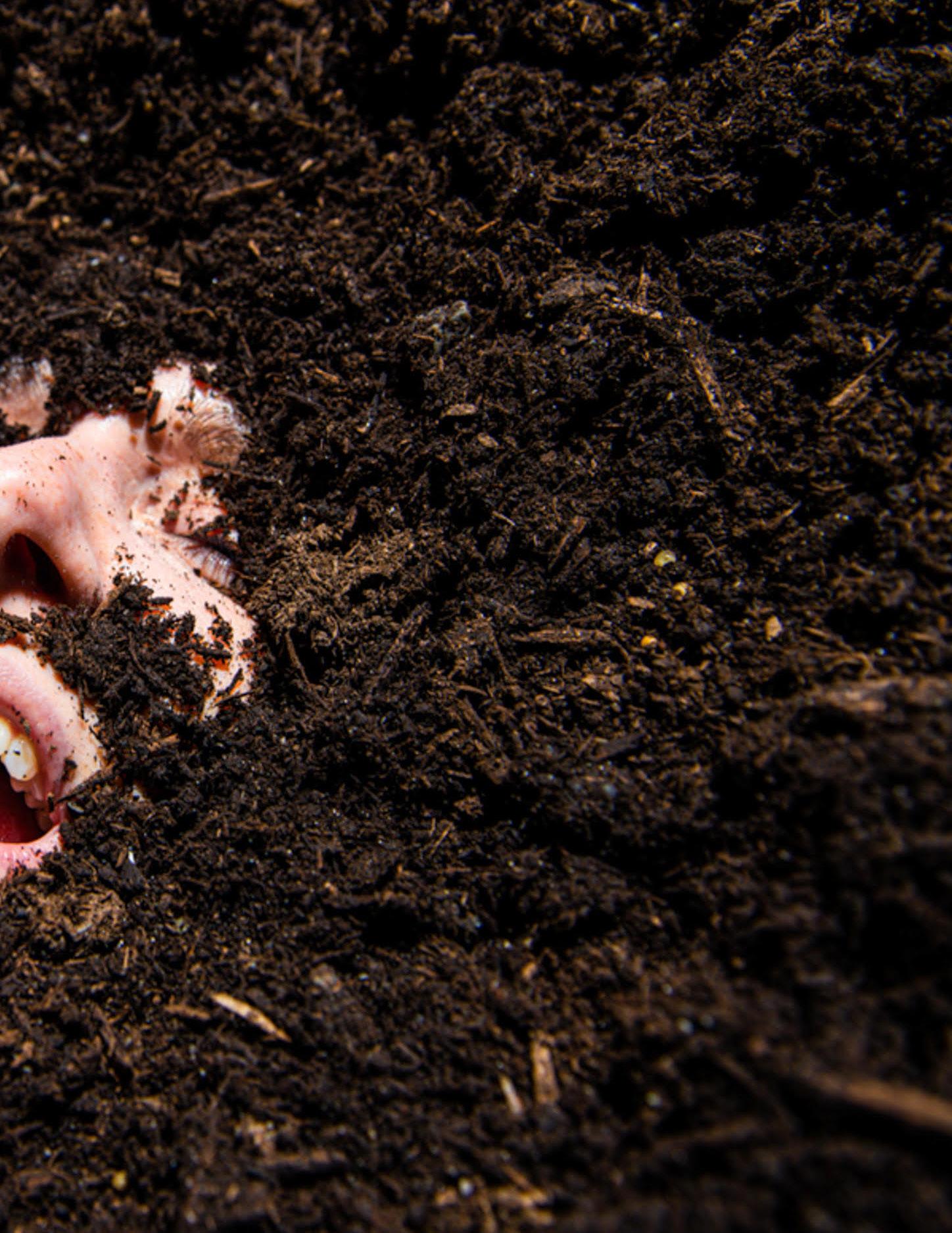
Late Summer's Eve, Eve
by Sam Moe
There were two days before Iris’ eighteenth birthday and the two of you decided to sleep in the sand pits beyond the edges of the forest. You were still seventeen, your hair bleached with pink and amber streaks, wrists covered in bracelets. Later, you’d look back at these photos, taken with disposable cameras, and recognize the familiar stacks of rubber and beads clicking together, likely you relapsed, had been hurting yourself for the second year in a row, unaware of how worse it was bound to get.
Nothing mattered, back then. You were harboring a buzz of a crush for your best friend and you couldn’t tell her, neither of you having admitted you liked girls, both of you suffering from abusive men.
You tried to make a flyer out of crepe paper in art class but your teacher was judgmental so you threw it away. Iris said you could use your bras, write on them with Sharpie, and spray-paint your socks lime-green and hot pink. You were going to the woods to find yourselves, to forget about things for a while.
She waited up your street at dusk, headlights barely visible in all the fog. You made sure to stuff your sleeping back with pillows in case your mom checked on you, begging her to let you sleep in the basement with the creaking window. Careful not to catch your thighs and hands on the rusting metal as you jumped into the rock garden, walking along the bushes so as not to trigger the flood light.
Inside her car, you’re safe. In earlier versions of this story, you wrote about how she had skin grapes. Now you’re older, you know you can call them bruises, her ex-boyfriend was responsible for dangling her body upside-down over
31 | Issue 7
a staircase, hitting her with a chair, and his fists. You tried to be supportive and asked her what happened, but all she managed was a shrug. She dropped something on her thigh and it left a mark. What happened to your wrists? You tell her your cat scratched you and nothing more. In the back seat is a princess tent purchased from the local pharmacy. You’re worried your group might be eaten in the night by wolves, you joke about splitting open your palms and becoming blood sisters, both of you afraid of everything but scars, praying for a portal to open in the earth, for your blood to spirit you into another life.
He was your best friend’s brother, in the same graduating class as Iris, a year ahead of you, unaware of your existence until you came hurtling into the technology store in which he worked, desperate to get his attention so you fabricated elaborate lies about his sister, dramas which never happened, could he please sell you a phone. In less than two days you’d be in Europe with your mother and your sister and he wouldn’t remember you existed until a year later, sending you a friend request in the middle of the night. Your phone was a treasure in your hands, a promise of what was to come, quite the gemstone, easily breakable, and when shattered, never able to be put back together the way it once was.
He lived near the sand pits, just a ten-minute bike ride from your house. You were twenty-three, in love with your partner of three years. Still, when this crush from your childhood called, suddenly you were car door slams and speeding through the back roads of Sudbury, Massachusetts, rushing to a cluster of bike paths to his house where he’d press you against the wall and leave a necklace of bite marks along your collarbone. His house is still tucked away in a neighborhood nicknamed The Grid for its intersections of walkable paths, clusters of pine trees, and aster, Lake Boon not far beyond. Wealthy Sudbury parents who didn’t keep track of what their kids got up to tied their boats to the shore, lived on Martha’s Vineyard in the summertime, cracked open navy lobster bodies with their eager, manicured hands. He was
Winter | 32
stuck in the same life as you, both of you working in retail, suffering through the days so you could tangle up in each other at night.
It's always the same bar. Faded green seats, a bartender who suspects the two of you were falling too deeply into each other but never said anything. Too-warm beer and a patio for the smokers. Everything was Christmas lights shaped like peppers, warm floors soon to be sticky with spilled vodka, the two of you eating sweet and spicy chicken, dipping thick husks of celery into blue cheese dressing. Legs entangled beneath the bar, heads pressed together, you refused to kiss in public, when people asked you told them he was just your friend, when your boyfriend brought him up you told him he meant nothing, he was a phantom, a monster at best, poltergeist at worst, nothing to worry about. Soon he’d be gone, a permanent hole in your already selfish heart.
The back roads of Sudbury, Massachusetts don’t have streetlights. Even the houses were dark, everything like ink, like the ocean, filled with secrets, creatures, discarded flip-flops, and abandoned bottle caps. Your mother warned you not to ride in cars with girls or boys, still doesn’t know you’re queer, and would kick you out of the house if she found out.
You and Iris parked down North Street, several yards away from your East, abandoning her mother’s Chevy outside a random lawn, what was it with your crushes always driving old red cars?
You tried to imagine the lives of the people inside their tidy houses, buttressed by rose bushes and oak trees. Were they happy, healthy, mothers, smothering? You asked Iris and she shrugged. It was the season of whispering. The street was full of mud puddles, the heat pressing in, thick. It was a July night, slick as oil, sky full of constellations you couldn’t name. In the future, you’ll recall how the two of you painted flowers on each other’s arms. It’s a strand you can’t find, not as you scour the corners of your mind, not as you reread your journals. You know now, of course, that memory is subjective. But sometimes you think your mind creates
33 | Issue 7
magic during boredom and danger, too.
Iris held a flashlight and you were empty-handed. You’d been walking for a while, across smooth stones and wooden planks, mushrooms and logs coated in moss, and fungus. There were creeks everywhere. You heard water, your breathing, bugs singing. Tugged on her sleeve, asked if you were going to make it through the night. She swatted you away as if to say, don’t be ridiculous. We’ve survived every night.
As the path narrowed, you grasped a corner of her sweatshirt, afraid to be dragged away by creatures made of poison ivy, roots for hands, empty beer bottles for eyes. Beyond the thick wall of fear hummed the crush, a secret you’ll keep until you’re much older, sleeping together in her childhood bed while her mother cooked breakfast in an old maroon kitchen, her father banging out Hey Jude on the piano.
It's amazing to you, even now, the things people don’t notice.
For starters, your boyfriend hadn’t noticed you were falling apart, your mother never noticed when you took her things. You stole someone’s bracelet on a whim, placing it inside a bag of kettle-cooked chips. Your mother called you delusional, this wasn’t about witnessing. All this will change later, as it often does, when she reveals to you she saw her cousin’s faded shape at the edge of her bed right after he was killed halfway across Manhattan. She’ll see shadows of crosses reflected on verdant lawns, your grandmother will see her mother on the edge of her bed and they’ll laugh until she realizes she’s all alone, she’s always been alone. When your cousin rips your photograph off the wall, you’ll notice. When she dances through the family’s apartment to try to change the energy of the place, you’ll see it. The ghosts, still there, now pressed against the walls, no longer block the path like willow tendrils. The first time Iris and you kiss, you’ll feel her scars on her shoulders and thighs, careful not to make everything too tender.
There were train tracks up ahead, familiar, abandoned, spoon-leaved moss and pincushion, moody and
Winter | 34
"You're worried your group might be eaten in the night by wolves, you joke about splitting open your palms and becoming blood sisters, both of you afraid of everything but scars, praying for a portal to open in the earth, for your blood to spirit you into another life. "
35 | Issue 7
seductive. The tracks form a bridge over a lake yellow with pollen, a box hanging beneath the iron coated in graffiti and filled with empty beer bottles. Your names in bright-pink spray paint from a few weeks ago, she asked if you wanted to go inside but you’re afraid of what might be lurking—spiders, jaws, hands. The forest would turn against you within the week. Your sister is in the front seat of the car, smoking weed, blowing thin streams of smoke out the window into the night. Sudbury is cold, could be June or December, you always return home twice a year before the heat gets bad before ice storms begin. Some winters you arrive to trees sweeping streets, limbs coated in ice crystals, and banks of snow on either side obscuring houses beyond. Other summers are hurricane seasons, your basement floods several inches, and your mother is pissed regardless.
Old crush is gone, and your history has been whittled away into nothing more than an acorn at the center of your being, made of iron, mostly impenetrable except for when you return home and it melts, collects new memories, and rebuilds. You are sick to your stomach without him but it’s been years and he doesn’t live by the shore anymore.
You’ve begun your excavation process, pissed off because you can’t tell your sister what happened to you. And what would she have done? What could she possibly do, now? Her temper encourages her to spill over at points, telling your secrets to people on your behalf, he was the same way. I’m going to hurt him, you recall him saying after the most recent time. But there are too many men, the list goes on and on. Today is June, meaning warmth, smoking on the back porch instead of hiding in the basement, your mother will return for three months, and you won’t be there long enough for most of her rage. But you are there a Friday she comes home, New-York-City-exhausted, she tells you they’re going to install a new back door downstairs but you ask her too many questions and she gets so angry, screams at you in the middle of the kitchen. You’re sixteen again, in trouble
Winter | 36
for any number of things: sneaking out of the house, stealing jewelry, being born, causing grief because you need to be clothed and fed and there is no money, swearing when you’re fed up, hurting yourself, the list rolls on. Your therapist will later tell you your nerve endings are all shot, and you learn to make yourself small. He wants you to focus on breathing exercises, to remember to stop yourself before the paranoia becomes too entangled.
Healing feels impossible around anyone, especially your mother.
“After we get food can we watch Naruto?” your sister asks.
“Definitely,” you reply, already thinking about taking your journal into the basement.
The only thing making you feel tethered to reality is writing. You’ve been keeping track of your life since you were thirteen, doodling hearts in the margins over a boy who would flirt and never confess his feelings. The two of you kissed in a basement filled with aquamarine streamers and confetti. That night, on the phone with your best friend, you confessed, your heart thrumming between your teeth like a drill. She told you she couldn’t believe you, upset because she had feelings for him, too. For the next year she and her friends—boys and girls who used to be your friends, too—kick you. They wait for you in the bathroom, taking turns tripping you, slapping your arms, your face, everyone calls you a slut. You spend the year eating in the bathroom, journaling through your hatred, the situation eerily similar to that fated summer with Iris. Unsurprisingly, she was your only friend until she moved away to college during your senior year of high school. Alone for the first few months of the year as you tried to make new friends while your old friends abused you in the very same forests you’d slept in as teenagers, tents printed with different cartoon characters, old red trucks with peeling paint waiting by the side of the road to whisk you into the night. You rode in cars with abusive boys who told you they cared about you, begging hundreds of times until your will gave out.
You never told her, but she always knew. In summer
37 | Issue 7
you started sharing the same bed, hesitant hands affected from trauma finding each other’s bodies in the dark.
“Is it weird to be back home?” your sister asks.
“Of course not, it’s great we get to hang out,” you tell her, your past lingering like a rash.
It started with biting because of course it did. Didn’t you know you weren’t meant for sweetness?
His teeth formed rings around your neck, and lips brushed but never touched, your first kiss was a shock to the system. When you finally slept together, storm rain smacked against your bedroom window, and the rest of the house stood empty; your mother and sister were away at school and you abandoned New York City for four days, eager to see him. Afterward, you steal his sweatshirt, fingering the holes in the sleeves, inhaling his scent of cigarettes and liquor. Evenings in bars downtown, days spent lying in bed watching movies, drinking bottles of wine at a friend’s house. The three of you toasted to your friendship and ate a dinner of gummy worms and crackers with sharp cheddar. You later passed out in the sunroom, waking to the two of them making out on the couch. You argued in the car about how it meant nothing. You were still a little buzzed and by the time you put the car in park, you were crying beneath your sunglasses.
“Look at me,” he said, tugging you towards him. “Fuck off,” you replied.
You crossed the bridge slowly, tightrope walkers in the night. Approaching the sandpits, Iris grabbed your hand, you tried not to trip over railroad tracks, and hid your face, now hot, from the reflection of the moon. Up ahead stood a tear in the trees. The two of you paused in the circle, still young beneath a sky full of stars.
Safe in the pits, you pretended to be the last two people in town while waiting on the boys. You already ripped your skin open on the back of your hand, dripping bloody
Winter | 38
smiles on the sand. You wished to be a farmer, tucked away with animals and sand. The two of you could stay together, grow vegetables with eyes and mouths, and watch wolves migrating in packs across an imaginary backyard. Later you’ll write stories about how romantic you think it would have been to be eaten alive, even more, romantic to be a pond or a howl, a cat so feral no one could restrict its movements.
You dug your fingers deep into the earth. Iris examined poisonous berries, all red and shining, the boys beyond smoking stolen vanilla cigars by a bonfire. The earth is so cold you feel your fingers go numb, though the air remains tinged with humidity, the evening still oily, it was another midsummer’s eve, eve. If you disappeared into the woods and became wrapped in ivy, who would save you? You’d turn bloody and raw before being swallowed by the earth. What kind of plants would your body grow? You think only of purple mold and mussel mud.
Iris was still breathing even though she claimed to have eaten the berries. The heat snapped and you lay together, five of you jammed into one tent. In the distance are sirens, your mother snoring softly, clouds taking bites out of the moon.
“I have my period,” Iris whispered, so you left for the 24-hour pharmacy in the truck of one of the boys.
He wouldn’t give the two of you clear directions, making jokes about how it was so late, you were driving into the mouth of outer space. There was blood in the sand pit, a half-full tent, and a blanket mess back to the car. You purchased gummy worms and honey potato chips, jars of sweetcream iced coffee, and cheese crackers shaped like suns. You wondered when things would break down. Your body, your relationship, your bond with your mother.
Back in the sandpit, the temperature dropped. Come five in the morning you layered yourself in sweatshirts, fingers shaking. Iris led you to her car where you crank the heat and head to a McDonalds for breakfast. The two of you hid down North Wood Street, half-asleep as it began to rain. Your eyes were heavy, your body sore, Iris whispering next to you,
39 | Issue 7
Open the windows, you know I want to feel the rain.
There are still so many stories you haven’t yet told your sister. She sits on the couch next to you, plucking chunks of weed to use in a grinder, occasionally responding to a barrage of texts. You have been going to bed around ten and eleven in the evening, attempting to mimic some sort of pattern, but now you are back home in Ocean House, now you are distracted. Over a single month, you’ll write dozens of poems about your exes and crushes, the bonfires stoked inside your chest always by other people, rarely do you cup your embers in your heart to warm your hands, rarely do you feel safe from danger when you’re back in this compression space.
Your second poetry book has come out and sits on your mother’s coffee table. The poems are hybrids, melting together memoir and fiction into prose poems and numbered stanzas. She asks who the stories are about—stories featuring brides running through forests, lobster crates and thousands of fathers, mothers angry and half-drunk at the sink, unraveling daughters and sons, crushes on men and women, coral reefs and dead starfish decaying on porches—so you lie.
“They’re about my friends,” you explain, which is partially true, you’ve never been married, chasing your wife through the woods, you’ve never opened a bottle of wine in a rusted red house off the coast with a friend who will never break your heart.
These pieces are little mountains, little kaleidoscopes, consuming all your memories and then spitting them out in a tangled knot, you place your body in hundreds of never-before-occurred situations, wondering what limits your heart might meet if you put her in a ship with Iris, the two of you arguing over an anchor embossed with love words and slang. He is there, too, on a farm you’ve never been, tying you up in roots, later he’ll be in your baptism poems, gently placing your head in the sea. You are fourteen and your crush is gluing back together a snowflake ornament you’ve broken six times, yes even he’s here, he’s a metaphor in the form of snow, frost, lilacs, and wealth.
Winter | 40
Friday night, after boredom has eaten away at your mind, you head to the karaoke bar in town with your new best friend for food and alcohol. He is there—no longer fourteen and pushing you into the hands of his flame-haired girlfriend who calls you a bitch, he is in his late twenties, and he is smiling like nothing ever went wrong. You know the woman he’s with, a girl with a wolf for a name, she asks if you two know each other, and tells him stories about how she used to hang out in your basement when you were kids.
“Oh yes, I’m familiar with her basement,” he says, grinning at you, and you’re at your fourteenth birthday, the disco ball and the man singing Electric Light Orchestra has disappeared, the two of you are kissing amongst seaweed-hued streamers.
Again? Again.
He has asked you to go to the woods with him and his new crush, a woman you went to high school with named after a star. He tells you he can’t bite your neck anymore in the night, he’s trying with this new woman, but he takes you to the woods anyway, what you’ve come to call the killing woods, for this is where the boys of your youth brought you one summer and / fractured / your mind / knees to floor / moss / amber grass / no one came / you were / still are / a blood clot.
Red mittens and your grandmother’s pea coat, which reeks of New York City, and yes that means sewers and cigarette smoke, birthday cake not on your birthday, and spilled boxed wine. The new crush is ahead, a star to his night sky, you are last, more anchor than human. But you can barely walk across the half-broken sheets of bright blue ice and lake below, and soon he gives up, reaches back, and takes your hand wordlessly. See, you wanted to tell yourself, it wasn’t always about teeth but hands, his hands, wrapped around a coffee mug in a Maynard diner, his hands inside of you, around your throat, rubbing your palms after a double at the restaurant and your muscles ached so much you thought they might catch fire from their pain. His addictive tenden-
41 | Issue 7
cies towards self-harm in the same shape as yours, scars in a different location, the time he found out you’d relapsed and he’d yelled at you, you thought to yourself, yes, this is when I’ll start to heal with love, and wasn’t all love a heartache. Perhaps that’s what you wanted. Your face was so open those days, desperately proclaiming for everyone to save you.
Months later summer has twisted in on itself, been folded up like a tablecloth, and stored inside mother’s dresser. You are now thirty-three and at your new job in a different state, giving a reading in one of the university galleries. The walls are dimly lit, covered in beautiful art pieces that are maps, blue paper, and oceans, and some of the folds look like eyes and mouths. Your new friends are there, as are forty or so strangers, a table filled with cheese and crackers, powdered doughnuts made entirely of powdered sugar. Don’t be scared when you walk up to the podium. Please be clear when you tell their stories when you make jokes about absent fathers, old crushes, and him, and make sure everyone leaves knowing the past. Your voice might shake when you get to his poem about the ice walk, let it. Your heart might seize at the thought of his new wife, so be it. When your colleague gives a speech about your writing she’ll use words like stars, scars, and healing. You’ll dig a little hole in your arm, and move through it. Your therapist will later tell you it’s good to be aware of your triggers, the bright scratch has disappeared, and he’s still proud. You haven’t yet broken your two-year period, there isn’t any blood today. And when your student comes up to you and shyly asks if you’re okay when she tells you she brought her friend who whispered during the reading, oh my god, is your teacher depressed? Know it’s okay, you’re going to laugh out of anxiety.
“I’m totally fine,” you’ll tell her.
“Are you sure?” she’ll ask.
Your new friends will hug you and you’ll spend the rest of the night wondering if they’re concerned about the pieces read about self-harm or the joke you made about not thinking of him anymore.
Winter | 42
Sweet Boy Looking Out
by Kenneth Gulotta
To avoid the caterpillar street and keep the dog happy, they turned toward the bayou. It was December, and any eggs laid by buck moths wouldn’t hatch until the spring, so they really had a few months before they had to start worrying about walking under the oak trees that canopied the street, about tiptoeing around the stinging caterpillars that fell each year, some plague that Moses forgot to mention. But Sweet Boy’s memory, though canine, was long—it didn’t matter that it had been the previous April, eight months before, when he had stepped on one of the spiny worms, like still-groping, severed tips of tentacles, and had limped away from the resulting brown-and-green smear at the edge of the concrete. Every time they turned down the caterpillar street, he still veered to the center of it, cringing, whining repeatedly in general protest, and turning to growl occasionally at the sidewalk.
To Amanda, avoiding that left turn onto the street seemed the least they could do.
“Shouldn’t he be over this by now?” Mitch asked. “I mean, it’s a pain in the ass to go this way—it’s an extra three blocks, and we don’t even pass a trash can, not unless we schlep all the way over to Esplanade. Saving little baggies of his crap until the trash man comes is getting old.”
“It’s not his fault,” Amanda said. “You should have been watching where he was walking. How would you like to get stung by one of those things?”
“I have been stung by them. I got stung by them all the time growing up. I just figured his, whattaya, his paw pads or whatever, would protect him from stuff like that. Doesn’t it seem like they should? I mean, if they’re supposed to provide
43 | Issue 7
enough protection for him in the wild, shouldn’t they stand up to a stupid stinging caterpillar?”
“He doesn’t live in the wild. He’s not a wild dog. He’s a city dog.”
“Ain’t that the truth. He wouldn’t last a day. He’d just lie down in the bushes and wait for someone—anyone—to come along and rescue him into some air conditioning.”
“Just go back home.”
“What? What’s the problem?”
“I’m sick of you being mean to Sweet Boy,” she grunted, leaning down to brush a piece of bark from one of the dog’s paws. “Just go on and go out with Jim like you were planning. I’ll finish walking him by myself.”
“That’s a goddamn ninety-pound dog, just about, not a little lap poodle.”
“Go away.”
“Okay, whatever. I’ll be home whenever. Don’t wait up.”
He started walking away.
“Bring the trash can back in, please,” she called, standing back up. “So I don’t have to with the dog and all.”
He waved and passed into the dark under the tree branches. He reappeared partially as he neared the lamp on the corner, but then he turned and was gone.
Amanda and Sweet Boy crossed the road to the grassy bank of the bayou. They began walking along it, following the slight curve of the water’s edge.
“You’re such a smart boy, Sweet Boy,” Amanda said. “You remember. You remember where those things hurt the paw, don’t you? So smart. You know not to go back, because you’re a smart boy, and you’re sweet. You’re Sweet Boy. You’re just your mama’s sweetness!”
Sweet Boy bounded ahead, stretching the slack line of the extendable leash all the way and then dancing back to her in twists and little circles. Other people walked their dogs ahead of her and on the other side of the bayou. They were lighter patches in the growing darkness; occasionally, they whistled and called a variety of names: Rufus, J.T., Clover, Milly, Gumbo, Goliath.
Winter | 44
Goliath was a little gray terrier mix that you could just about hold in one hand. There he was, up ahead—he and his person were turning off, heading home. Sweet Boy stopped and watched, his mouth closed, his forehead wrinkled like he was thinking about something.
“That little guy could fit in your big old head and have room to move around,” Amanda said. Sweet Boy turned his black snout to her. It broke into a panting smile. Then he dipped his head and snuffled through cool grass.
Amanda followed him, waiting for him to decide. He was taking his time. They walked past the building that looked like a retirement home. Amanda never saw anybody who lived there, so she wasn't sure. Sweet Boy finally hunched his back and squatted over a patch of tall grass. When he was done, Amanda pressed the lock button on the leash to keep him close. She pulled a plastic grocery store bag from her pocket and tugged it over her hand, bending to the tangled weeds.
“Why come you always pick the hardest spots, Sweet Boy?” she asked. He fidgeted a few feet away, staring across the water. He wagged his tail slowly at the sound of her voice. Amanda stood up and pulled the grocery bag handles forward around the soft warmth in her left hand. She let the weight hang free in the bag as she twisted and tied the ends. Something splashed and chittered in the water, monkey-like; Sweet Boy jumped back. Amanda dropped the bag and stumbled back a bit.
“Jesus!” she blurted. “That scared me, too.”
“Probably a nutria,” a voice above her said. She jumped again, and Sweet Boy looked up and growled.
“Sorry,” the man on the bridge said. He took off his baseball cap, but his face was still dark; the last bit of faint daylight was mostly behind him. “I was just saying, those nutria are all up in the bayou now—my dog saw one swimming in the water the other day and just about went crazy. She goes at those skinny fish, too. When they jump.”
“Huh,” Amanda said. She drew Sweet Boy near, settling him. He pushed against her leg, warm and rumbling, spurring her to take a little step to the side. “Nutria are those
45 | Issue 7
rodent things, right? Those things the police in Metairie are shooting because they’re taking over the drainage canals, just about?”
“Yep. They aren’t native—someone imported them I don’t know when, thinking they’d be good eating or for furs, but that stuff never took off. Now they’re everywhere. It’s an explosion.” He settled his possibly red cap back over his head, pulling it left and right until he had it adjusted. “Anyway, you have yourself a good night.” His face disappeared. He had gone to the other side of the bridge, she supposed.
Amanda picked up the tied-off grocery bag. She slid the button on the leash handle, letting the lock pop open. Sweet Boy ran up the bank ahead of her. Midway up, she started drawing the line in, pressing the button again and again to reel in a couple of feet at a time so he wouldn’t run out into the road.
They crossed Esplanade again. Amanda dropped the bag in the trash can on the other side, and then they walked on the grassy path next to the water, back the way they had come.
“Nutria,” she said to the dog. “You could handle one of those, I bet. I was scared it was an alligator. I guess one could come up in here. Could you protect us from a big old alligator, boy? I don’t think we’ll chance it. No, no, no. I think we’ll just go on home.”
Up ahead, a man and his dog walked toward her and Sweet Boy. The dog danced loose around the man, unleashed. The man raised his fist above the dog’s knobby head and moved it back and forth like he was about to throw a ball, but he wasn’t holding anything. The dog jumped at the spaces beneath the man’s arm.
Amanda groaned. She thought about crossing Moss Street to the sidewalk, but cars were rolling past—the light behind her had just changed. She drew Sweet Boy’s leash in and locked it. He saw the dog ahead and gave a low, testy grumble. “You hush,” Amanda said. “Don’t go starting any trouble. Hopefully, they’ll just go on past.”
A few seconds later, the dog noticed Amanda and Sweet Boy. It surged toward them, letting loose punctuated,
Winter | 46
"...Sweet Boy paused. He peered into the dark gap between the houses. It bristled with the various trees and plants the two men next door tended to on weekends, ferns and palms and other things whose names Amanda didn't know. Sweet Boy dipped his head low and growled again."
47 | Issue 7
muttering barks and growls. Amanda pulled Sweet Boy in tighter. His low growl erupted into a full, open-jawed snarl, and he twisted from side to side, keeping the other dog before him, even though Amanda kept his head tethered against her hip.
“Call your dog back, mister!” Amanda yelled at the man. As he neared, the man beamed at the two dogs and, strangely, clapped his hands.
“It’s good,” the man said. “I want him to play with the other dogs. I want him to get friendly.”
Amanda struggled to keep Sweet Boy against her. “My dog doesn’t want to play—you need to leash yours and get him away.”
“They’ll be fine. They’ll be friends.” The man clapped his hands again, swiftly and close to his chin, like a child at a birthday party.
The other dog circled, hunching low and barking louder.
“Please get away!” Amanda cried, teetering as Sweet Boy lunged.
“Asshole, she said take your dog and go!” someone shouted behind her. Amanda glanced back; it was the man in the baseball cap.
“I’m just trying to socialize my dog here, buddy,” the other man said.
“Well, they don’t want you to. You need to ask permission first. Seriously. Do I have to get rough with you, guy?”
“Nah-uh.” The man reached down and hooked his fingers under the dog’s collar. He pulled the dog back. Its paws scrabbled, pulling tufts of grass up. The man, hunched over, led the dog away. “Just trying to socialize the animal,” he muttered. He moved slowly off without looking back.
Sweet Boy’s snarl lowered to a softer and sporadic growl as he shifted from side to side. He stopped moving, and then he sat on Amanda’s shoe.
“Oh, now you settle down,” Amanda said to him. She looked at the man in the cap. “Thanks,” she said. “I don’t think that man meant anything. He was just, he seemed a
Winter | 48
little—enthusiastic, I guess.”
“Yeah, I was probably rougher than I needed to be,” the man said. He lifted his cap, scratched at his black crew cut, and pushed the cap back down. “I just get annoyed when I see people ignoring the leash laws. You know? Like they want the rest of us to handle their animals because they won’t.”
“Yeah, I do get that. I was already nervous just seeing that loose dog way up there.” She waved at the expanse of grass ahead. “Anyway, thanks again. I better get him on home.”
She took a step, and the man asked, “What kind of breed is he, anyway?”
“He’s a mutt,” she said over her shoulder. “Some kind of Newfoundland mix.”
“Nice.”
She and Sweet Boy continued walking. She glanced back. The man was crossing Moss and heading down one of the side streets.
“Good boy,” she said. “You were ready to eat that other dog up, weren’t you? But it wasn’t your fault. It wasn’t his fault and it wasn’t your fault.”
They walked on the grass until they reached Bell Street, where they turned left and worked their way through the neighborhood toward their house.
As they walked past the green-and-gold house right next to theirs, Sweet Boy paused. He peered into the dark gap between the houses. It bristled with the various trees and plants the two men next door tended to on weekends, ferns and palms and other things whose names Amanda didn’t know. Sweet Boy dipped his head low and growled again.
“Now, what are you seeing now?” Amanda asked him. “Or are you just scared of the caterpillars again? That isn’t the caterpillar place, you. Let’s just get inside, away from everything.”
She tugged his leash, and he followed her to their front walk. The empty trash can still stood next to the street; the lid was lying on the sidewalk next to it. Amanda snorted back at the empty can as she dug her house keys from the
49 | Issue 7
pocket of her jeans.
Sweet Boy scrambled up the porch steps. She climbed after him and unlocked the front door. She unclipped Sweet Boy’s leash from his collar and opened the door to let him run inside. She started pulling the door shut but paused to listen as Sweet Boy scrabbled across the living room and began growling and barking at the side window.
“Hush!” she yelled. He stopped barking, but he kept growling. “Good enough,” she said as she closed the door. She tossed Sweet Boy’s leash on the porch next to the doormat. Her house keys dangled from her right hand, making silver coin music as she trotted down the steps and over to the trash can. She grabbed the lid, snapped it over the empty can, and shuffled backwards, dragging it around the side of the porch. Her head snapped back. Something was hooked in her hair, yanking. The back of her neck burned, and then her fingers were torn from the trash can’s handle and began burning, too. Someone twisted her right wrist, jerking it, spinning her. A faint red curve reeled a few inches away, just above her, and the man in the cap caught her left wrist, too. He pushed her arms toward her chest and tried to turn her and shove her into the grassy gloom of the alley. Amanda unlocked her elbows and shoulders and squirmed to the right, pulling from him. He jerked again, hauling her toward the alley as she tried to plant her feet, struggling to stay in place. He bent, grunting and straining to drag her. Amanda switched: she stopped pulling and grunting, and instead, rushed at him, stabbing with the cluster of keys still clutched in her fist. She jammed one into the skin just above his left collarbone.
“Ahhh!” he gasped, choking off a shout as he sucked air into his whispering mouth. He tried to tighten his left hand around her wrist and push the key away, but she turned it, digging it further into his flesh.
“Bit-chhh!” he groaned. Amanda twisted the key left and right like she was trying to loosen a stubborn lock. He let go of her left hand, and she clawed at his eyes with it. He whipped his head to the side, but her thumb slid over the edge of his right eye socket.
He screamed then, shoving her away and running.
Winter | 50
His knee bumped her. She stumbled around the porch, up the stairs, and into the closed door, collapsing against it. She groped at the handle, fumbling, until the door swung inward. Sweet Boy poured out and past her, snarling and slobbering as he bounded down the steps and to the left across their little patch of yard.
“No! Sweet Boy, back! Sweet Boy now! To me! Here, Sweet Boy!”
He stopped at the end of the block, barking wildly into the darkness beyond, looking back at her yelling at him, and then turning to bark and growl again into the streets that angled away among the houses and trees. Finally, he spun and looped back, springing to her. He ran up the steps and through the door. Amanda closed it behind him and worked through the various movements of the locks: twisting the deadbolt, pressing the button on the knob, trying to fit the disc on the chain into the track on the door. Her hand was shaking, and she couldn’t keep the disc still long enough to get it into place.
Sweet Boy whined next to her. Amanda dropped the chain, squatted, and pressed her right hand against his head. He lowered his snout and bumped his head into her chest. She started to pet him with her left hand and saw a red and white, wet pulp under her nail. She stood and took a few steps to snatch a tissue from the box on the coffee table. Sweet Boy followed her. She sat on the floor next to him and grabbed her cell phone from the coffee table, too.
She dug the flesh and jam from her thumbnail with one tissue, and then she wrapped another tissue around her thumb. She leaned into Sweet Boy and flipped her phone open. She talked to him and the phone as she tried to dial. “Unlock, come on. Wait. You can just dial. Damn. Don’t cry, Sweet Boy, I’m okay. You watched out for me—you did, you good guard dog, you were looking out, I should have paid attention to you from the start. I got him, though. The cops, they’ll have some marks to look for—if I can just—nine, one, one!”
She pressed the last number, and the handle on the front door rattled. She jumped into a crouch as the deadbolt
51 | Issue 7
clicked, but Sweet Boy just looked at the door, panting, and looked back at her. The door opened, and Mitch came in. He was carrying a pizza box.
“Yo,” he said. “I come bearing gifts.” He closed the door and faced it, holding it in place with his knee as he locked it with his free hand.
“What are you doing here?” Amanda croaked.
“Jim left a message saying he’d decided to go to the game instead. So I figured I’d run by Venezia and get us one of those pizzas with the fried eggplant you’re into.” He turned from the door. “You know. Peace offering and all.”
“Why didn’t you bring in the goddamn trash can like you said you would?”
He took one step forward, then another. He lowered the pizza box slowly, like it contained something fragile as blown glass, to the top of the television.
“What’s wrong?” he asked. “What happened?”
“Nine One One, Emergency,” a man droned from the speaker of her phone.
Amanda pressed it to her ear. “I need—I need the police,” she said. The operator said some words she didn’t understand. Mitch took another two steps toward her. She sat back down next to Sweet Boy and put her free arm around him, and she asked the operator if he could repeat that, what he had just said, could he repeat that, please.
Winter | 52
Motherland by Hannah Cruz
cw: mention of physical abuse
My dad announces that he’s found his joy — no, his gozo— as well as deep magic in the Motherland of Puerto Rico. Literally a mother’s land, I think, as he sends stanzas from “Song of Myself” — the grandparent born there, now dead ten years, what would she think of him? If he could see her as a child, would it change him? Weirdly, I don’t think it would. He talks about her like a martyr. When Pops would beat on her he says over and over, she would sing in the kitchen alone, Janis Joplin songs. The secret of her anguish. Whitman says: from parents the same, and their parents
53 | Issue 7
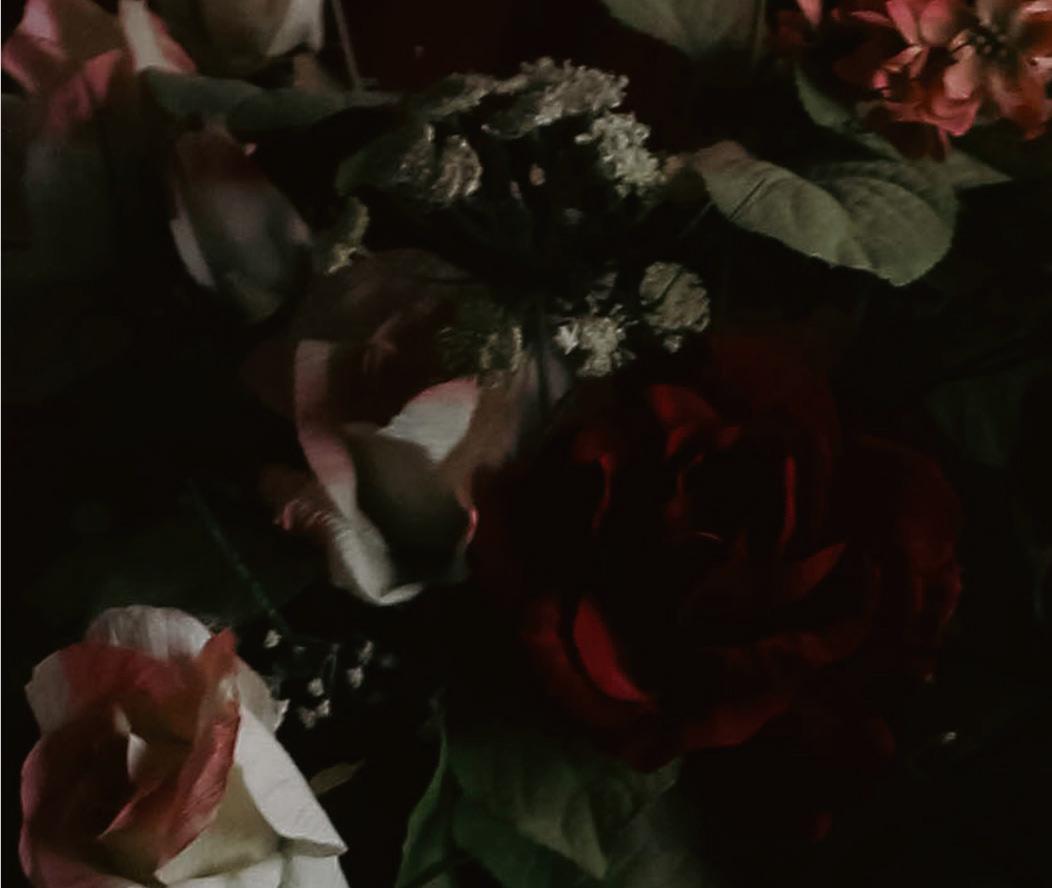
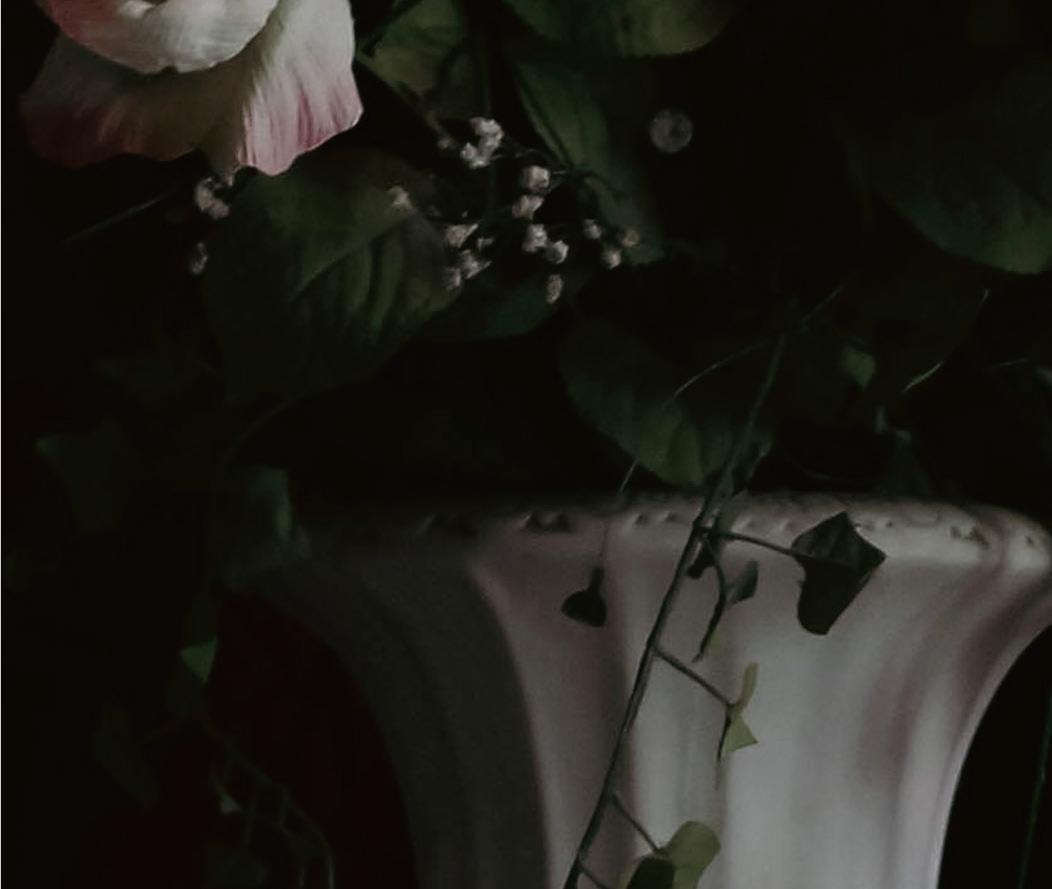
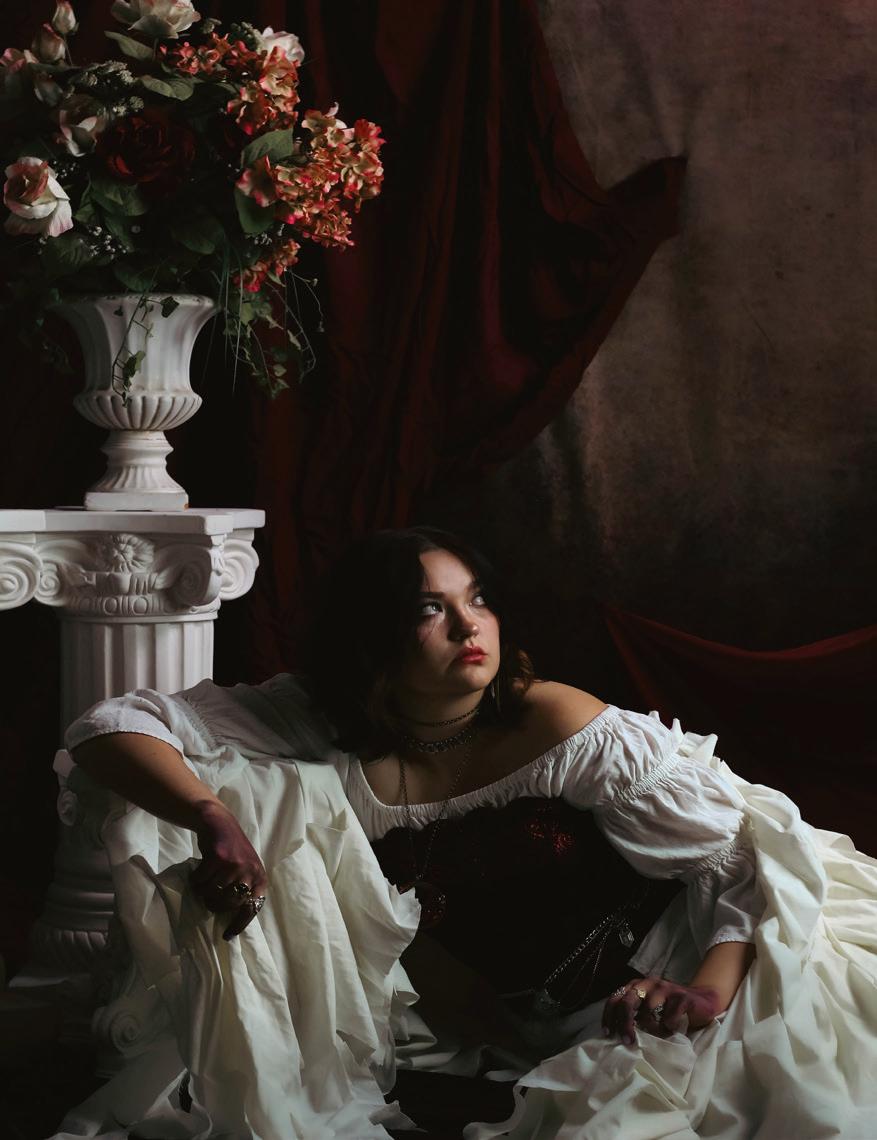
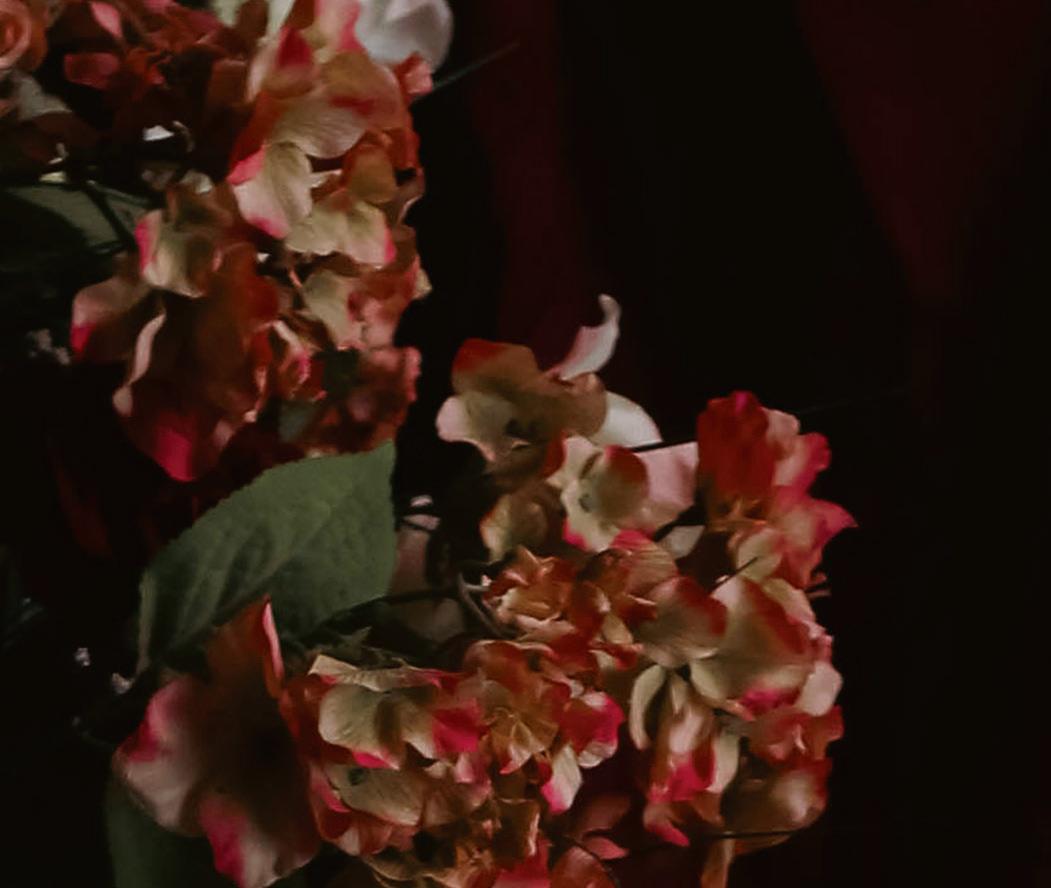
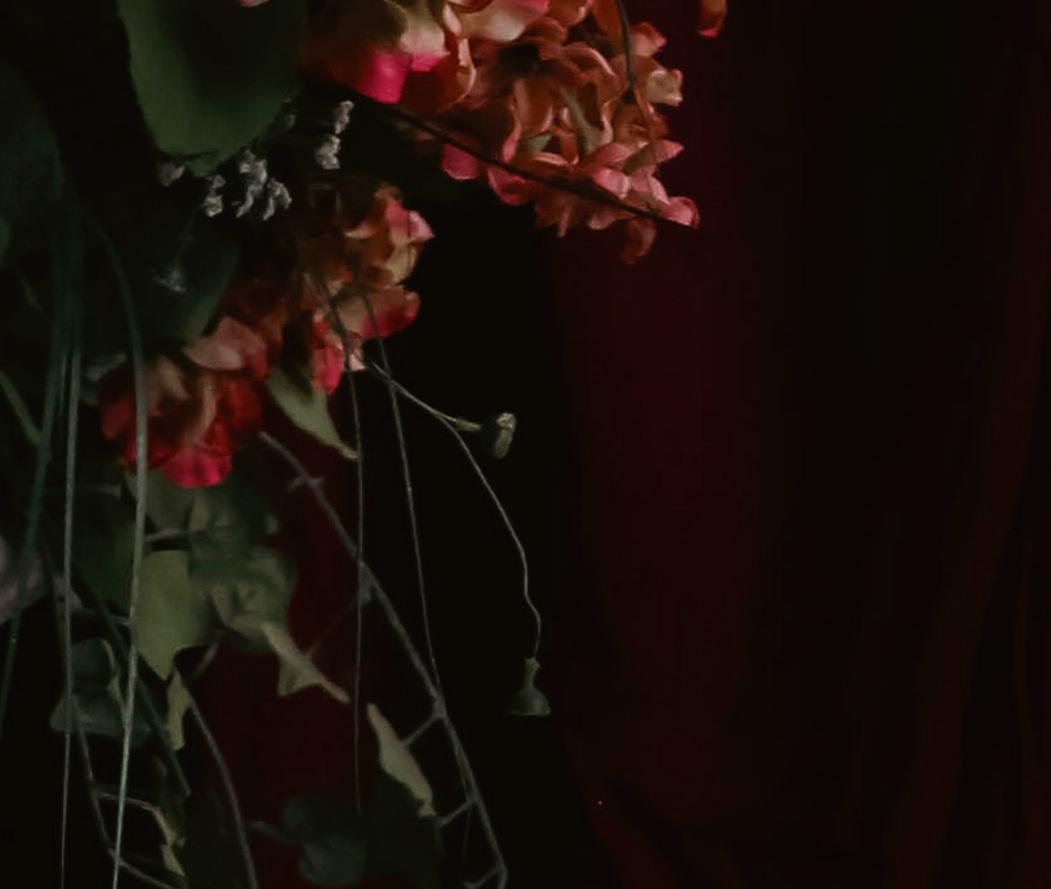



identity by Paula Maseda
i was a sheltered kid with a hundred broken bones and a blue brain torn in knots.
i was a flaming ferocious force of nature, a magnificent venture into abandoned glimpses of failures.
i was your hand in my soft belly and i was your claws scratching my insides like limp jelly. i was ready and steady
to be everything, near anything, to become the impossible just to feel some sort of tenderness.
i searched for it recklessly in every bone, skin and body that came close to my nurturing nothing, that came close to the holy empty rushing of
55 | Issue 7
awkward emotions choking on my bloodless heartbeat.
i was anything but myself:
fragmentary, fully scrambled. i was anything but my ache, yet i came from heaven and hell to bring myself flowers that bloom, sacred and pure, to bring myself flowers that burn.
Winter | 56
Laundered by Angela Townsend
Good can come from wetting your pants in Poughkeepsie. I would not have believed this in 2000, but then I was sifting through all sorts of beliefs like confectioner’s sugar.
One of my cures for those clouds was walking. To my mother’s horror, I would prick the Vassar bubble, slip like a glow worm through the wrought-iron gates, and ramble the sidewalks of a sagging exurb.
In a pixie cut that made me look like a lollipop, wearing a leather jacket too stylish and too carnivorous for myself, I practiced indifference. On campus, in life, I was a splatter-paint smile, a goulash of tenderness without prudence. I favored little pink hats and ditsy floral skirts. I was florid affection, incapable of self-protection.
But out in Poughkeepsie, I was a black cat, sleek and clawed. If anyone looked at me, I looked back with confidence but no smile. My steps were quick and light; my vibe was heavy. I was nobody’s fool.
I could fool myself until I stepped off the sidewalk. The moment I meandered into the deli for a decadent can of Giorgio mushrooms or a Times, I fell back into the flowers, telling the clerk her 5” cranberry nails were divine, helping the gristly old man reach the last Dr. Pepper.
Back on the beat, Thank You For Shopping With Us! bag over my elbow, I honed my edge. I walked farther, daring the city limits. I looked at the men and the churches. I did not look down. I did not look innocent, which was a dizzying optical illusion.
I did not look at the time, and I did not consult my body. This was chronic, as evidenced in the misbegotten hair-
57 | Issue 7
cut and the role of Extra chewing gum as a pillar of my diet. A chemical analysis of my genome would have shown 49% Diet Coke. My survival of those years is proof that humans who spend enough time with cats are afforded multiple lives.
But living off dining hall apples, sporadic Giorgio mushrooms, and holy liquid aspartame, the bladder bill was always about to come due. I did not count the cost before one particularly long Poughkeepsie strut.
I began to feel the fear about six blocks from campus. When you drink twelve Diet Cokes a day (you do not know how much I wish this was an exaggeration), you know how to “camel it.” But at high tide, even a body held hostage by a mental Kremlin can stage an insurrection. I was going to wet myself.
I began to cry about three blocks from campus. It was terribly wrong. Beautiful, confident eighteen-year-olds did not pee all over their jeans. I was neither, but I was right in the midst of pretending. My performance art was a sham. Everything was about to explode.
I began to run about one block from campus. I tossed my mushrooms in a dumpster, as though their four sloshing ounces would slow me down. I raced like a doomed stray in an owl’s shadow. I raged against the daffodils, helpless friends lining the campus gate.
I made it to my dorm, made it to the empty bathroom (sweet mystery of mercy!), made it to the door before the levees broke. All over the floor, all over myself, all over every pretense of power.
No one saw me, but I was exposed. I wept bitterly, rolling my jeans into the Thank You! bag and hiding them in the closet. I called my mother.
“Honey, it happens.” She said all the right things. “Take a shower. Take a breath. Wash your jeans.”
“I can’t wash my jeans.”
“What?”
This was the craven insult to my yellow injury. I was the cat too cool for dorm laundry, high on the wall above the quarter-carrying ferals. My mother knew I brought laundry home most weekends, but she had never realized…
Winter | 58
“…you have never used the laundry there even once?”
Correct.
“Then this is overdue. You have to do it. It’s a rite of passage for everybody.”
But I was not everybody.
I was the floral print who was sweeter and cleaner than everybody. I smiled at everybody. I encouraged everybody. I did not let my jeans jostle with hints of anybody’s flesh.
But now they were stinking in my closet. I had walked like a common cat, and I felt the weight of my tail between my legs.
I had to do it.
Thus began a swift lesson in the acquisition of detergent, the alchemy of cash to quarters, and the descent to the bowels of Raymond House, a feral floor I’d never visited. There were pool tables down there, pungent odors and peeling paint and beige appliances from the Reagan administration.
I trickled in my shame, hurling my jeans into the cauldron with great force. A boy in a beanie was sorting socks. I could do this.
I could not predict that sudsy solidarity had only just begun.
My Vassar laundry career was checkered at best, hissing with hilarity that was gruesomely unfunny until later.
There was the time someone put hard-boiled eggs in the dryer, with results ten times ghastlier than you are imagining right now. To this day, I doubt it was intentional but wonder what level of intoxication is required for such an error.
There was the great tie-dye crime scene of 2002, when Washer #5 ran purple with the blood of someone’s bad idea.
There was Elijah, the towering flannel bear who learned my laundry schedule and mistook my soft fabric for something more than friendship.
There were long-tailed strangers I saw nowhere but
59 | Issue 7
downstairs, their faces and underpants embroidered in my memories. And when the Great Launderer launched me into seminary, I was ready to wash.
My hair had grown into a cacophony of curls, and I’d lost the leather jacket in translation to my cottony heart. Princeton was no Poughkeepsie, and my carbonation calmed to curiosity. I smiled at everyone. I drizzled my dorkiness in every tub. I was pink, unbleached, uncool, a body among bodies.
The first week, I found myself looking forward to doing laundry.
And I found Frank and Dr. Wicket.
Bald and bright, Frank was a Presbyterian Ron Howard, a happy hamper of gee-shucks and grace. He was 23 but looked 50, and we came to look forward to each other like clean sheets. We sat on the dryers, debating Hauerwas’s ontology and Princeton’s premier frozen yogurts. It was safe to tumble with Frank, a friend with no edge and no intentions.
Dr. Wicket was a sporadic soap bubble, the New Testament professor whose family chose the wrinkled life of Dorm Faculty. He sang Paul Simon over the machines and constantly ran out of dryer sheets. He won international awards for his insights into Galatians. He was sweaty and exhausted and laden with holey socks. We saw him in his hoodie and his heretical moods. He saw us outside of The Soteriology of Paul.
We all saw each other dueling the dirt and greeting the day, claws and fears and leather and grace and works all tangled together. The liturgy of laundry lays us all low, a baptism of equals. Nothing stays clean, but everybody comes out alright. Often with a heap of hilarity.
I have my own washer and dryer now, a stalwart stackable unit that keeps my secrets. I wouldn’t trade it for a lifetime of public laundry.
But once you’ve wet yourself and sloshed among the bodies, you are changed. A sidewalk sinner, you need not practice power. A washable saint, you dare not starch your smile. You are just another black cat in blue jeans, and your fellow pilgrims are many. It’s an absolute mess.
Winter | 60
English Leather
by Kevin B.
He always wore English Leather. Sundays would come around and he’d tap lightly on the front door. His car would be idling outside. Before I’d hear the engine or see his blonde curls dangling above his lingering smile, I’d smell the English Leather. Like all good fragrances, it strikes you differently depending on which scent resonates in your memory. For some reason, I took the lemon first. It reminded me of a glass pitcher sitting on the counter. My mother on the porch, talking to a man I never knew the name of. That man had a softer engine. You could barely hear it as it pulled away from our house.
My summer knight drove a light Cutlass with a nectarine air freshener hanging down almost to the radio. I couldn’t figure out where he’d find something like that, but he had a tendency to collect items that were slightly off-center. When I got in his car, he’d always ask to buckle my seat belt for me. As he leaned over, I’d smell the lemon first. Then, the lavender. I didn’t know that’s what it was at the time. I just knew it smelled like flowers burning. It didn’t matter that I’d never seen a flower burn.
So much of my childhood was spent behind doors that only opened from the outside. When my mother left with the man on the porch, my father told me that our house didn’t need any women. It would be just us. Two men who could leave their clothes on the floor and clog up the drain and get all the toppings on our pizza whenever we ordered it. When girls would come around asking if I could come
61 | Issue 7
out and play, he’d tell them that I was sickly. That I couldn’t handle the pollen and dander. He told one girl from the neighborhood that I was allergic to ragweed, and when she asked what that was, he told her to mind her own business. The door slammed in her face, and I never saw her again.
My father never wore cologne. He worked as a foreman at the manufacturing plant in Scoville. When he’d come home I could smell the sweat on his wrists and the tobacco on his breath. He’d sit down in a recliner stained with Michelob and cigarette ash. Our house always had more absence than oxygen. You would take a deep breath and there’d be nothing there. You’d take another, and a little part of you would disappear as well. My father would fall asleep watching the news with a paper plate on his lap featuring a crumpled up napkin and half a pizza crust. If I tried to clean, he’d accuse me of being a fairy. Real men didn’t clean their houses. Real men let the dirt get in. If things were too clean, somebody came looking to find out who was doing the cleaning. The glass pitcher sat in a cupboard above the oven behind another door we never opened. You could drink beer or water in my house. Never lemonade. Never anything too sweet.
Two days before my high school graduation, I smelled lemon on the porch. The man didn’t knock. He could see me through the living room window.
On days like this, I was trapped in the house with no way to get around. My father was putting in overtime at work so he could afford to buy me a car for finishing school. I’d be going to Tulane in the Fall, and I’d drive whatever he bought me to campus along with anything I could fit into a cardboard box and my record player. I’d been listening to nothing but Rumours since it came out that February, and the man with the blonde curls walked up on the porch just as Stevie was talking all about how she didn’t want to know why love kept walking on down the line.
When I came to the door he told me that he was
Winter | 62
"That man had a softer engine. You could barely hear it as it pulled away from our house."
63 | Issue 7
looking around the neighborhood for a room to rent for the summer. He had just finished his freshman year at the local community college. He wanted to stay in the area instead of going home. He never said where home was and I didn’t ask.
Looking back on it now, I question how much of young love was all about not asking questions. I could fill in those men with any details I liked. As soon as somebody taught me to inquire about people, I stopped loving as deeply. After that, it was all long, drawn-out sips of wine at nice restaurants listening to men talk about how their wives didn’t understand them. I never had a wife, and my father praised me for it. He thought I was smart. It never occurred to him that maybe my disinterest was born out of something other than personal history. He would proudly tell people about his son in New Orleans, who happily stayed a confirmed bachelor. I’m sure the neighbors would laugh at him behind his back, but I can’t say for sure, because I never went back to visit.
I didn’t go for a ride in the Cutlass the first time the man with blonde curls showed up on our porch. That first time, he just asked after a room and when I told him we weren’t renting, he asked for a glass of water. I provided him with one, and he left.
The day after my graduation, after my father had presented me with a beaten-up Javelin, the man showed up again and asked if I’d like to go for a ride. There was no discussion of why I’d be intrigued by such an offer. Some believe that like attracts like, and back before it was proper to declare your attractions, there did seem to be a preternatural way of finding the love you were looking for even when none of your doors would open.
On that first ride, we went to the supermarket and he told me to pick out something we could snack on while we parked down by the football field. I grabbed grapes, because I liked the way they popped in my mouth, and some Italian bread wrapped tight in white paper. We sat by the field and listened to “Shadow Dancing” until the real shadows showed up and the
Winter | 64
grapes ran out. To this day, when I bite down on Italian bread, I feel the pop of a grape between my back teeth. When I eat a grape, I smell lavender. Smoke and herb, resin and rosemary.
He would pick me up everyday after that. I worried at first that my father would disapprove of my disappearances, but he never commented on them, or he didn’t care. I’d come home and find him on his recliner, and I’d take a second to pull a blanket over him or dispose of an ashtray before he could burn down the house. Who managed to keep him alive after I left was always a mystery to me, but not as much of a mystery as what happened to the man with the blonde curls. He knew I was leaving eventually, but we never discussed an actual date. Our relationship was never physical except for the last night I saw him. He pulled up in front of my house, leaned over, and unbuckled my seatbelt. As he did, I took in every molecule of his cologne. The levity of the bergamot, the cheer of the orange. While I took him in, he let his lips graze the side of my neck. I heard the click of the seat belt coming undone, and when he pulled away, our eyes set out an agreement. The next time we saw each other, we’d have to make a run for it. At least as far as a tank full of gas could get us. The deal was silent, but understood. I thanked him for another lovely day, and got out of the car. I imagined my neck holding onto his middle notes--honey and iris.
I woke up the next morning with a little more absence. He was gone. No time for poetry, I packed my bags. Stevie was riding my record player; she was singing lovers and players. She was telling me all about the rain. It was time to leave. It didn’t matter how early it was.
65 | Issue 7

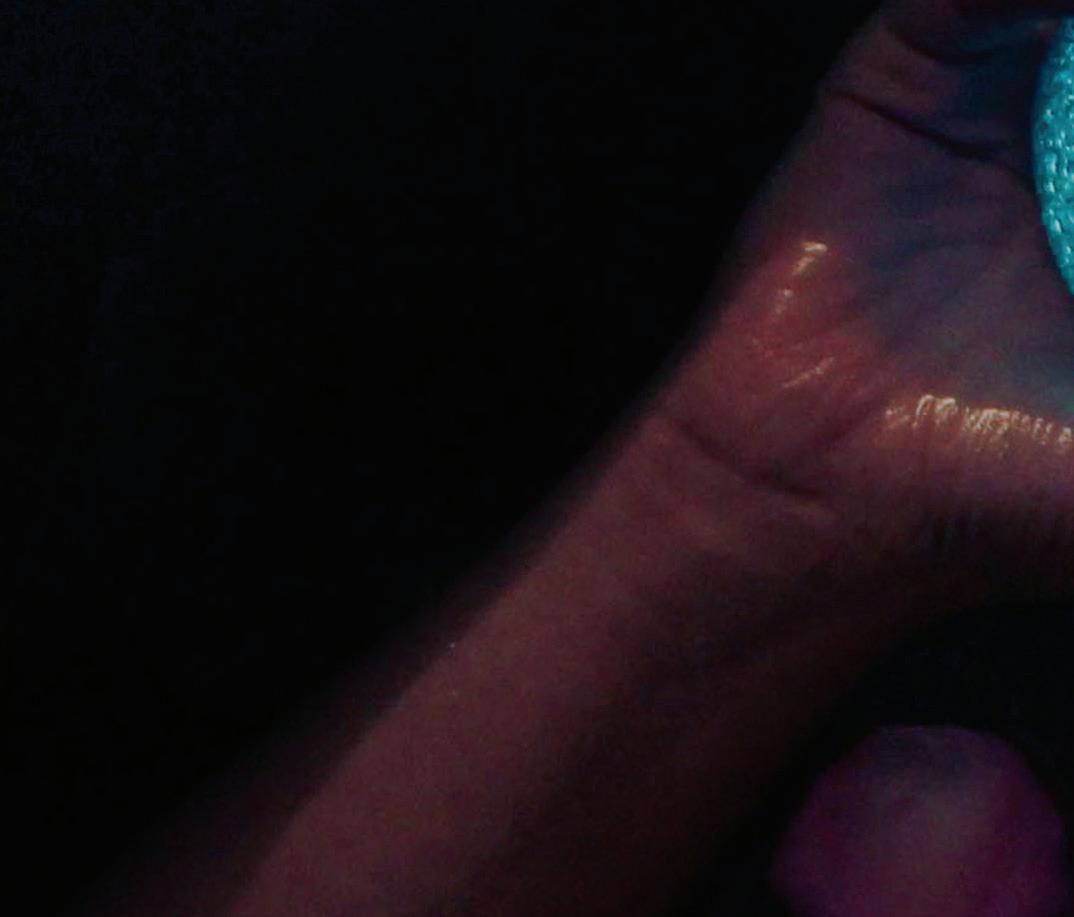
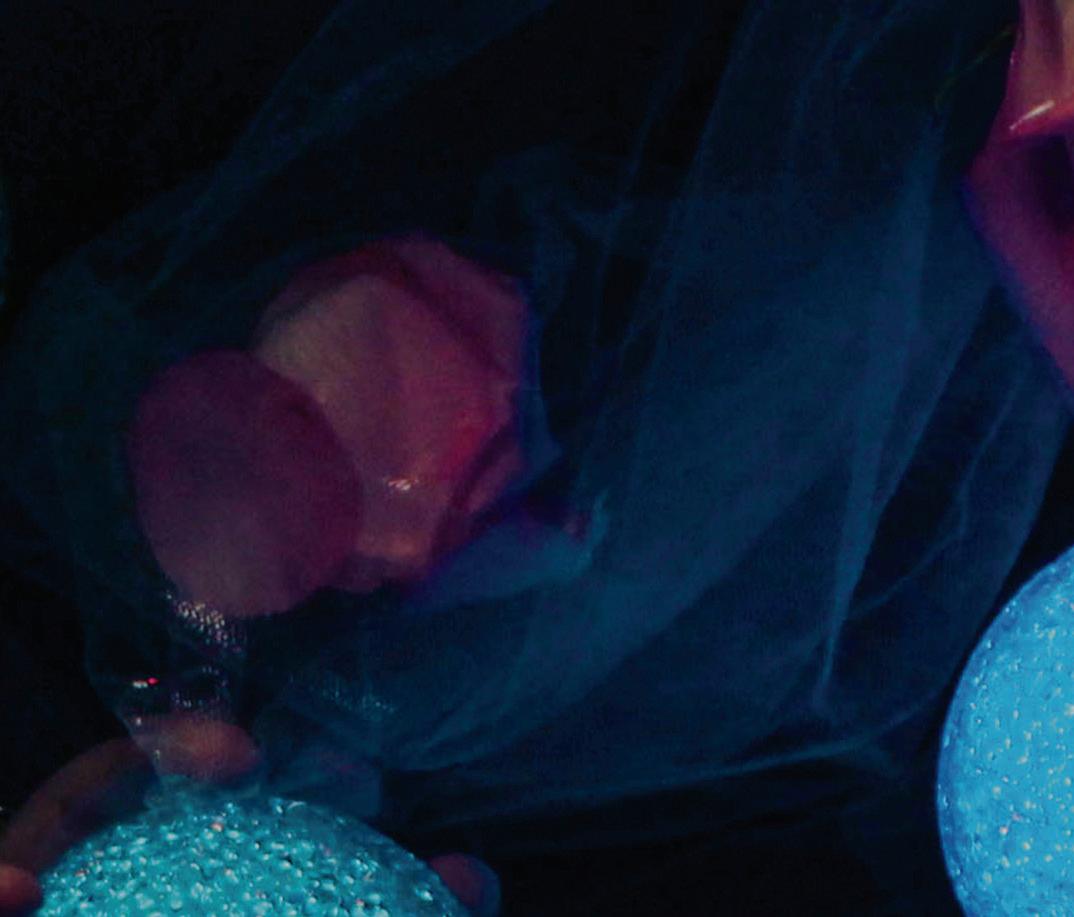
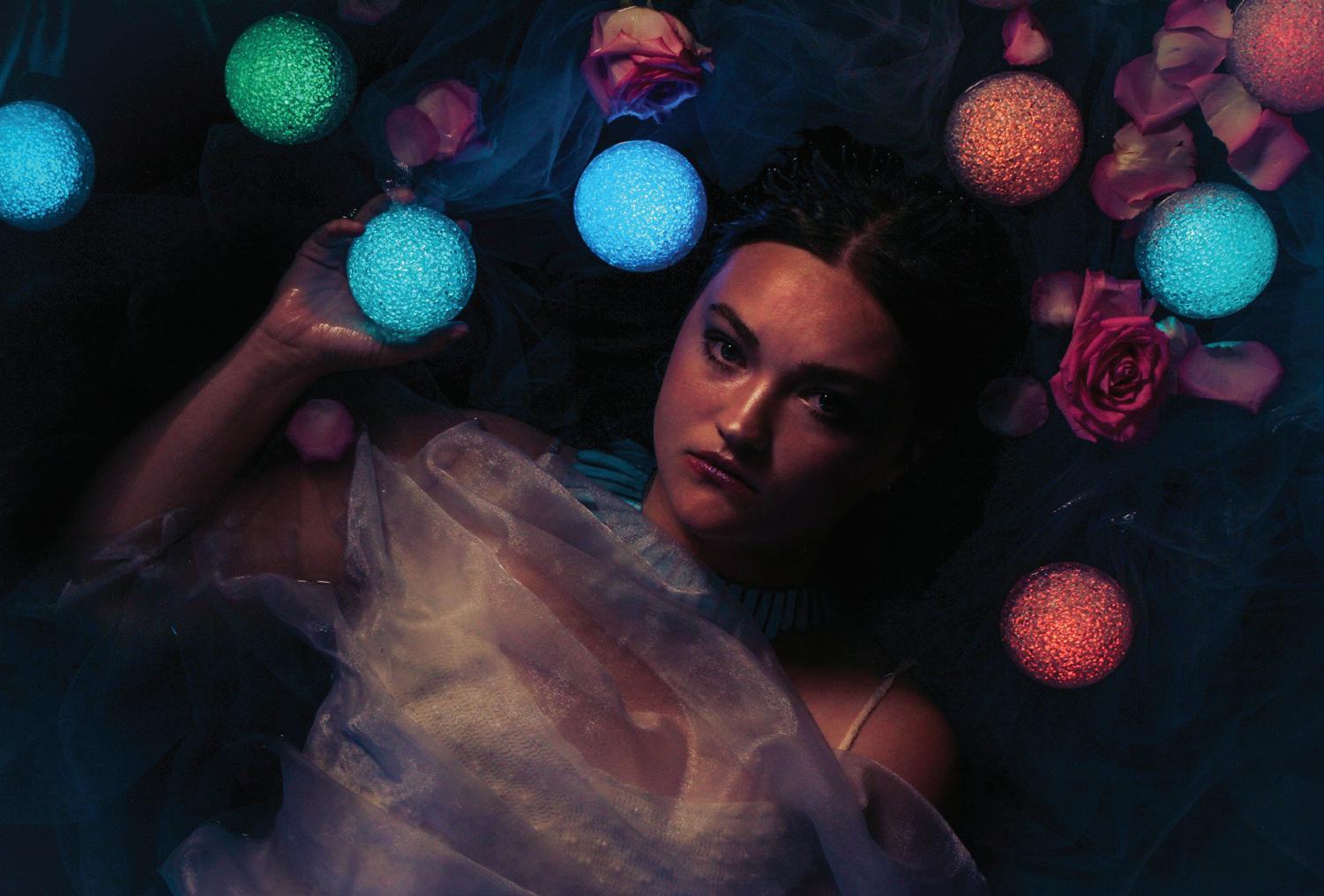
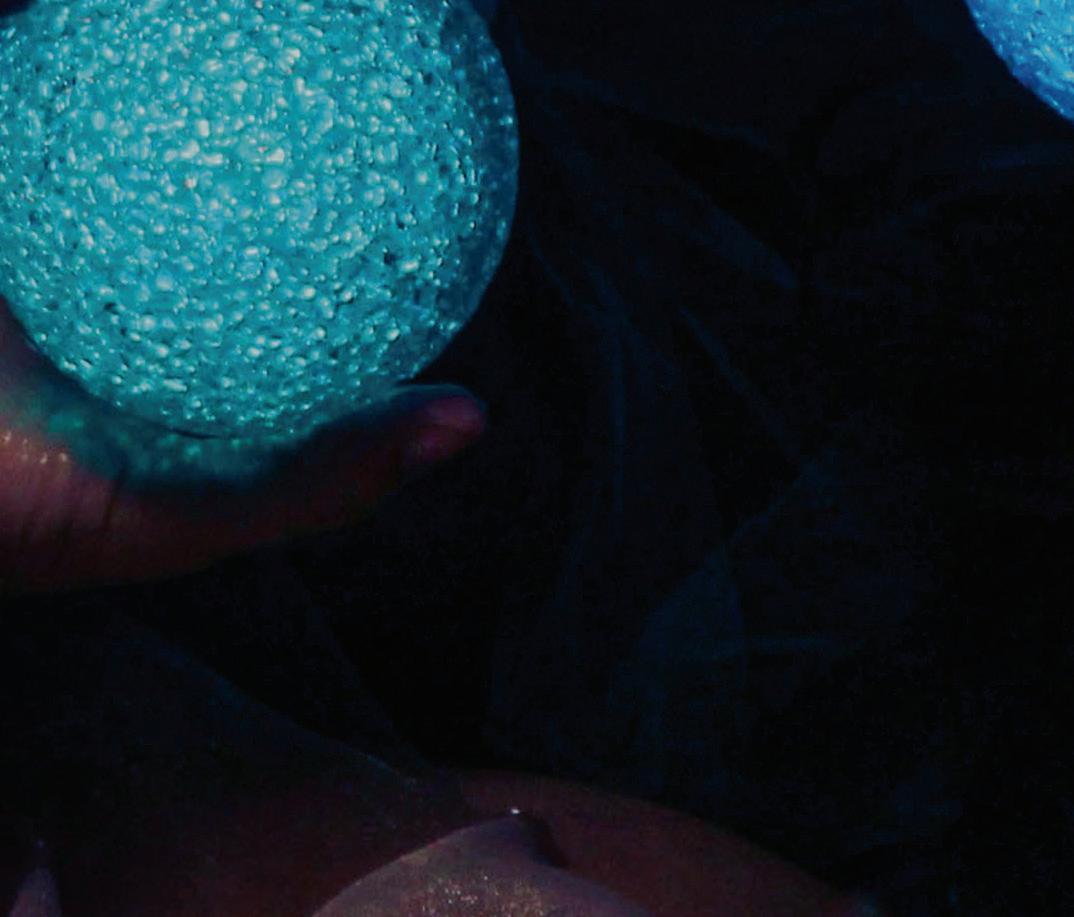

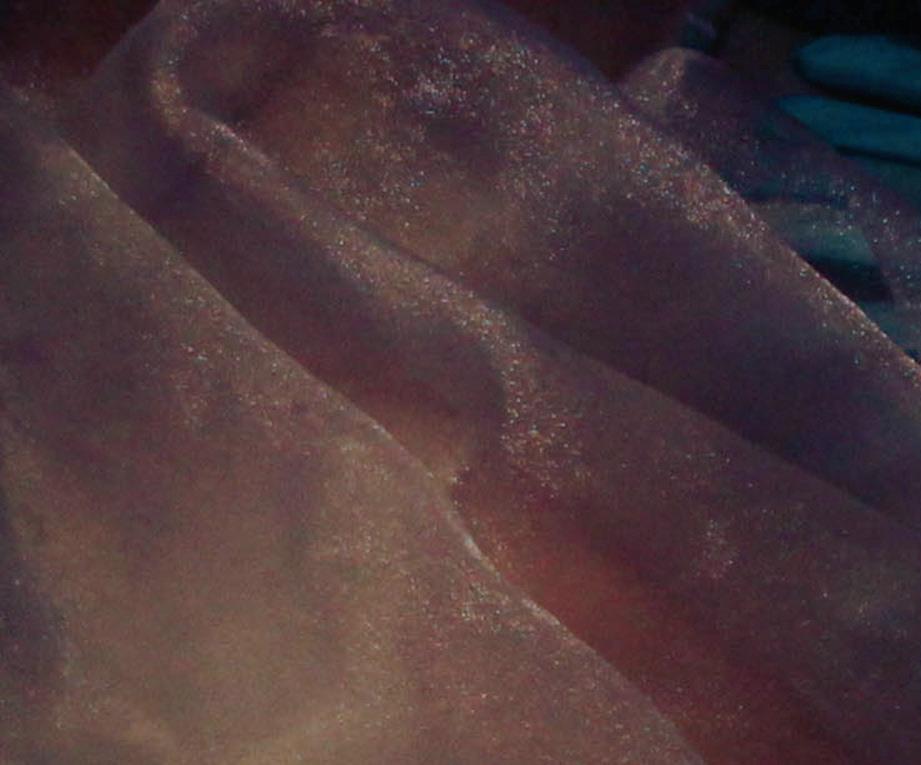
Winter | 66
to him i'm porn where i should be art
by Paula Maseda
to him i'm porn where i should be art. i belong to the streets: no city, no man. i fall for every guy that wants to fuck the emptiness away, fill my guts with lust and dread, fill my mouth with words unsaid. i fall for the potential of love, for the potential of sweetness, for the potential of pain.
does it look like I'm willing to tear myself apart for the sake of never-ending conversations about trust? does it look like my veins can bloom out of confusing contortions between my lips and his poison?
because i am. because i will. an incandescent green potion of heartless emotions is raving inside of my pumping and darkening sorrow: it was the shape of a tender craziness, almost dreamlike, almost nothing, almost fading.
67 | Issue 7
twilight of eternal bliss keeps his gaze locked in my tears, keeps his smirk placed in my fingertips for i only know him when he whispers on top of me every word that belongs to lovers and he utters them just for me.
i live vicariously through love songs and poems and films. i am an enjoyable dessert, a satiating treat. nothing else, nothing more, the icing on the tip of his tongue, the breaking of a desperate bone and the aching of a newborn inhabits my body
as he craves, as he gathers, as he gleams.
Winter | 68




Everyone I Love is Turning Into Soup
by Kolin Lawler
“Separation is natural" - The back of my smoothie bottle.
Kayla has lost everything, everyone she loves. And in their place lies cans of processed soups that she takes little to no joy in.
A note from the playwright - Although it's impossible to gauge how audiences might respond to this piece, whether it be laughter, shock, or bewilderment, it is important that the performers take the content completely seriously. Undoubtably the piece will fall flat if the actors treat it as a big joke (as mentioned, there's no gauging whether or not they will find it funny). In writing this, I wanted to devise a piece that places audiences in a precarious situation, where they may not know how to respond. At the bottom of page 8 there is optional dialogue that should be catered to how audiences have responded thus far. Respectfully, I want to stress that there is no wrong way for audiences to respond to this piece. Any authentic reaction is a gift.
Outside of a therapists office, JOAN, a therapist, emerges. It is the end of a long day and she is going home. Shortly after she walks out the door, KAYLA emerges, in a state of mania.
KAYLA
Joan.
Kayla? What are you doing here?
Joan it’s an emergency.
JOAN
KAYLA
JOAN
Kayla, my office is closed, I need to go home to my family. We can schedule an appointment for tomorrow.
71 | Issue 7
KAYLA
Please, just listen to me, we need to talk. You’re the only one I trust.
JOAN
I understand, but this is a firm boundary Kayla. I need to go home and you need to schedule an appointment. You were a no call/no show for the past two weeks and-
KAYLA
I lost my son.
Kayla
Beat. JOAN
KAYLA
He’s gone. Two weeks ago. That’s why I didn’t call.
JOAN
Oh my god.
KAYLA
I was holding him. Tightly. Telling him how much I loved him, cherishing the moment and-he left.
JOAN
What do you mean he left?
KAYLA
Remember when I told you about Thomas? He went missing, he abandoned his step daughter. And Eric-when he left me it’s all making sense now but, it’s also making no sense at all I don’t understand-
JOAN
Kayla-breathe.
Joan.
Yes?
She does, feigning hysteria.
KAYLA
JOAN
A tremendous shame overcomes KAYLA.
Winter | 72
Is there someone I can call for you?
JOAN
KAYLA
Eric and I were in bed together. We were lying there naked in each others arms. For the first time, I told him that I loved him. And I meant it. He told me that he loved me too. And he meant it. I went to the bathroom and when I came back- he was gone. I was gutted. When I went back to bed a few hours later, this was all that was left-
She produces a can of tomato bisque soup from her purse.
KAYLA
Tomato bisque.
She places it back into her purse.
KAYLA
And after Ben vanished, this fell on the floor.
She pulls out a can of New England clam chowder.
KAYLA
New England Clam chowder. Contains gluten and shellfish. It’s like some sort of sick joke.
JOAN
Have you been taking your medicine?
KAYLA
Everyday. No breaks. I’ve been nothing but consistent, I started going to spin class, I’ve been meditating, I joined a book club-I did everything I could for my mental well being, but the fact of the matter is, everyone I love is turning into soup.
Beat.
KAYLA
I read in one of my self help books, that if you really miss someone, and you want to bring them back into your life, you should go outside and hug a tree. Visualize them. Focus on how much you love and appreciate them. And they’ll find a way back. Shortly after I do this I get a call from Thomas’s wife Sarah, asking if I knew where he was. I was confused, horrified. I thought I brought this upon their family. I thought, somehow I did something wrong and brought this upon them. I was so ashamed-but now I know for sure. It was my fault.
73 | Issue 7
There’s no fault in loving someone.
JOAN
KAYLA
I always thought that God was love, and by loving others we were bringing the presence of God into the world. I’ve always had my heart on my sleeves, loving without hesitation. I always told people I was put onto this earth for no other purpose than to love others, and love them well. But all my love has done has harmed people. I’m lost. I’m completely alone.
JOAN
Does anyone else know about this?
KAYLA
After Ben left, and I realized what was happening, I smashed my phone and threw it into the river. I was too scared of the temptation to reach out to anyone. To bring soup upon those who they loved. I’m cursed.
.
JOAN
Kayla surely there’s a rational explanation for this, we need to contact the police and file a report.
KAYLA
I’m too frightened too. They’re gonna blame me. Assume the worst. Assume that I had motives to take everyone out. I’m connected to all these missing people, you understand? How would that look for me?
JOAN
Kayla.
Yes?
I need you to be honest with me.
KAYLA
JOAN
KAYLA
This is me being honest with you Joan.
JOAN
Did, did you kill these people Kayla?
KAYLA
Joan I’m not capable of that-
JOAN
Is there any possibility that, somehow, you lost consciousness-
Winter | 74
KAYLA
I don’t even like soup! God. I fucking hate soup. It’s either so hot that you burn yourself, or it’s too cold. And when its cold its revolting. The only saving grace with soup is if you have bread with it, and then what? Is it even soup at that point? Or is it just dip for your bread?
JOAN
Kayla, I need you to stay calm. Let’s go into my office.
KAYLA
Are you going to call the police?
It’s the responsible thing to do.
Joan.
Yes?
Do you-
Do I what?
JOAN
KAYLA controls her breathing, calms down, and begins to understand that this is the right thing to do.
KAYLA
JOAN
KAYLA
JOAN
KAYLA
Do you love me-like platonically. As a friend. Not just another patient to pay your bills, but as a friend, a person.
JOAN
Sit down with me Kayla
They do. KAYLA is holding the New England Clam chowder tightly.
JOAN
I set healthy boundaries with everyone in my care. It’s not helpful to you if I involve myself in that way. Theres a general love and respect I have for everyone in my care. But, I care for you Kayla. Not as a friend, but as a patient. Our friends are not our therapists. It’s why we have therapists. So we don’t overwhelm our friends.
75 | Issue 7
Yeah.
KAYLA
JOAN
Have you distanced yourself emotionally from your friends-
KAYLA
Joan please-
It’s alright.
JOAN
KAYLA shoots up and begins pacing.
KAYLA
Stop! Stop! I need you to stop, don’t mention my friends, I can’t think about them-I need to distance myself, try to forget, I can’t love them. Not now-I haven’t even had a phone, I wouldn’t even know if they’re alright in those moments where I slipped up and remembered them, felt the love for them in my heart-its not right.
JOAN
You’ve survived two weeks without love. That must have been awful.
KAYLA
Yeah. But it would be real lousy to have cans of soup for friends. Italian Wedding. Minestrone. Broccoli Cheddar. Split pea. Chicken tortilla. If my feelings get out of control, my whole world we be just one big grocery store soup aisle. Just me, and shelves upon shelves of soup that I have no interest in. Just me, rows and rows and rows of soup, and everyone I hate. Some life to live.
JOAN
Have you been experiencing any thoughts of self harm?
KAYLA freezes.
JOAN
There’s nothing to be ashamed of.
KAYLA
No. Not really. I don’t think I could. I’ve never wanted to hurt anyone. Not even myself. You see, I feel this sense that I have to persevere. And now, I have this bullshit to see through.
JOAN
I understand, but I have to do everything in my power to keep you safe.
Winter | 76
KAYLA
I’m gonna lose the house. I’m going to be homeless. I can’t go back to my parents. Could you imagine? Having your thirty four year old daughter, who is horrified at the prospect of loving you back, in your own home, while you’re giving everything to see to her safety?
Theres a shift in focus. A meditated distraction.
KAYLA
Do you remember that old Campbells commercial with the can rolling down the road?
JOAN
Vaguely. Jog my memory.
KAYLA
Well, there was this little girl at the supermarket with her mother, she took a can of tomato soup off the shelf. Her mom said something like, “No honey, we have food at home”, so she put it back. But then, the funniest thing happened. The can rolled off of the shelf and followed her home. Her mom must have been so confused!
JOAN laughs.
JOAN
Yeah, I remember that one.
KAYLA
Or that really annoying one with that stupid song, it was like, (singing) “Campbells, chicken noodle soup, possibilities!”
KAYLA laughs.
NOTE: I’ve included two context sensitive options for this next portion. Should the audience be laughing at the absurdity of KAYLA’s situation, she should use the first line acknowledging their laughter at her morbid situation. Should they be silent and perplexed, she should use the second option.
KAYLA
(If people are laughing) Sometimes when I’m real quiet, I can hear people laughing at me. But, I don’t feel like they should. Like there’s someone out there who can find the humor in my
KAYLA
(If no one is laughing) Sometimes when I get real quiet, I like to imagine that there’s someone out there watching me. Confused, but attentive. Sympathizing with me somehow. It would be nice you
77 | Issue 7
suffering. It makes me angry honestly. But then, I think about it. And maybe I’m glad that through all my pain there’s still joy to be had. A punchline. A clash of the cymbal. “That’s all folks.” It’s like, its soup. Okay. What’s funny about soup? Nothing!
know. Maybe I am worth feeling sorry for. But at the same times I wish that they would feel okay to laugh at me. Like, soup. Soups funny right? Just the word itself. Soup! Say it with me-
JOAN Soup.
They laugh together. Then KAYLA’s laughter becomes sobs. JOAN comforts her.
JOAN
I’m sorry for laughing.
KAYLA
No, I like hearing you laugh. It is pretty stupid right?
JOAN
No, it isn’t. This is very real. Losing someone you love is hard. But you know what’s even harder?
KAYLA
What’t that?
JOAN
Not loving at all. Kayla, we’re bound to lose everyone we love at one point or another. It’s part of the deal. It’s a shitty deal really. But love persevering in the certainty of eventual loss, is the greatest act of fearlessness.
KAYLA
So, should I allow myself to love others, even if I know they’re going to turn into soup?
JOAN
You don’t know that they’re going to turn into soup.
KAYLA
It’s a real possibility though.
JOAN
But what if it were possible they will turn into soup whether or not you loved them? What if you chose not to love them and they turn into soup anyways?
Winter | 78
KAYLA
I don’t think that would make me feel any better.
JOAN
It doesn’t change the fact that you lost them.
KAYLA
It means I’m more powerless than I thought I was.
JOAN
There’s never a convenient time to lose someone you love.
KAYLA
No. But you know what’s fucked up?
JOAN
What?
That you haven’t turnt into soup yet.
KAYLA
JOAN looks down at herself.
JOAN
Nope. I’m still here.
KAYLA
Which I guess means I don’t love you.
JOAN
That’s alright.
KAYLA
But I should. You do so much for me-you’re a constant in a very variable, confusing world.
JOAN
Sure.
I’m sorry.
KAYLA
JOAN
(Tearfully.) You don’t owe that to me.
KAYLA
Yeah.
79 | Issue 7
I’m still here for you regardless.
Sorry.
Don’t apologize.
JOAN
Beat.
KAYLA
JOAN
JOAN holds KAYLA for a moment as they lament together.
JOAN
I’m gonna step into my office, just for a moment, so I can make a phone call, is that alright?
KAYLA
Yeah, that’s okay.
JOAN
Are you sure? You can come with me if that’s helpful.
KAYLA
No, I think I need a moment.
JOAN heads inside. KAYLA, gazes upon the clam chowder, and after a moment, she rips the can open and swallows it down. It makes an enormous mess. She begins to sob, and after a moment, the door opens, and a can of soup rolls out towards her. She looks upon it as the lights fade.
END OF PLAY
Winter | 80
On a Night When The City Was Sick by Julia Rapp
The joke begins naked on the side of the highway beside a man who was about to decide we were incompatible. The hazards blinked like hungover eyelids as I crawled out the passenger window in a spectacular costume of flesh. On the comedown we leapt over the guardrail and into tall grass that was hysterical with dew and insects that bickered with our legs. I had been pulled into him by untraceable vows and the honesty of his shoulders. How I tried to outwit the obsession, but each touch was a spectacle of rain finding the throats of budding things. When he held me in silence, I imagined that he was savoring. What amount of desire is projection? The joke could have begun on a bare mattress with Faithfully playing from a little speaker on the floor of my room. I had invented a game where the loser would laugh first, but there was such certainty in the gutsy roll of the piano and each verse with its living insistence that love can endure. I had seen devotion in the spilled oil of his irises and studied him with confidence that I hadn’t earned. It bloomed like a welt when I decided I was in love.
81 | Issue 7
searching for light in the solis lacus by Shannon Dunn
your heart is the vast mars— a barren, sexless land with only possibility rather than confirmation of life mouth filling with dust
thaumasia unfound
i pray for your happiness only in the way a scientist prays for proof—illegitimate, godless, red becoming me
Winter | 82
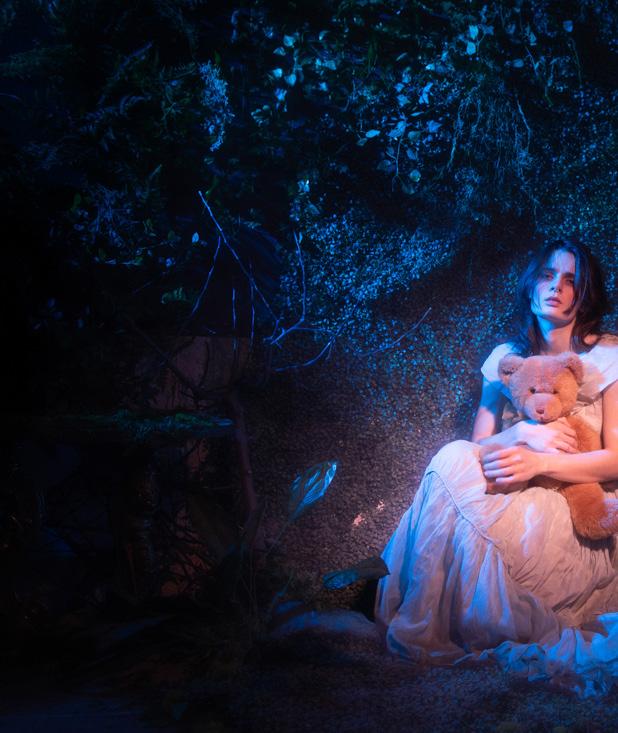

Miss Stallion
By Beto Huerta
You leave your vogue class, overheating from exhaustion, poor AC, and a bit of sexual tension. Sweat droplets form at the crown of your head as you exit the LGBTQ+ Resource Center, but they don’t fall. You won't let them. Not until you are in your car and no longer near the straight men who are loitering about. You’re not sure if they’re the same men you saw when you arrived—straight men have started to blend into one another. You normally wouldn’t fear them, but something about being in a pair of shorts that barely keeps your ass out of sight has somehow made you feel more vulnerable than usual. Something about looking visibly gay makes you feel naked. So, you pretend as if you have control over your sweat glands, and won’t give them permission to secrete until you’re away from the potential threat.
Away from the new gay friends you made in class, from the cute Taurus boy in a ripped tank, from the confident sexy dance instructor who announced to the whole class that “we have a stallion in the room y’all” whilst pointing at you. And you, not wanting to show shyness, wanting to prove that you belonged in this room full of gay men, quoted Megan thee Stallion, “that means come over and ride it.” And you smiled, thinking to yourself, that’s how you gag the girls. They laughed the way most people do when you say something out of pocket, which you do frequently because you love the validation that comes with reactivity. When the co-instructor asked if anyone in the room was eighteen, your twenty-four year old self jokingly raised your hand, eliciting a ‘bitch please’ from him. You danced to Beyoncé’s “Cozy,” praying that your hands were serving. Hoped the others thought, oh you ate
85 | Issue 7
that miss thing. You move with bravado and presence because your stature will always draw eyes—despite trying to hide on a few occasions. However, there’s nothing big enough to conceal you—despite your ex saying it was.
The cool air from your car’s AC feels nice against your sweaty brow. You text your girls, asking if anyone has dry shampoo because you aren’t about to pull up to the club looking like you have three strands of hair. Luckily, your girl, MJ, did. You spray enough dry shampoo to suffocate her entire complex. “Mmm, this is that good carcinogen,” you say between wheezes. After your hair is clogged to your liking, you change into a pink fishnet top, wear a corset over it, throw on your chains, slip on the baggiest pants you own, and stare in the mirror.
Happy that a pair of pants fit you loosely. Happy that the corset doesn’t give you a missing hourglass, but accentuates the one you have. Happy that you’re not being overlooked, but finally having your beauty recognized. Sad because these gay beauty standards have hands. Sad that you can’t have tacos al pastor. Sad that you didn’t have the courage to use your newfound beauty to ask the sexy dance instructor for his number. Happy that you're gonna look bomb at the club. Happy that your girls are hyping up your outfit, and you say slyly, “y’all are cute too or whatever.”
You and your girls Uber to this gay club you’ve been dying to return to. You feel a need to be unapologetically queer, like you had in vogue class, like you had when you came out at 17. And regardless of your parents’ furious and confused tears, you raged instead of begging for love, although you did do a little bit of the latter. The line is out the door and filled with SnapBack wearing, spandex dress having, tacky Versace glasses owning, gaudy pants ass people. You and your girls are disgusted—appalled really. You’re assaulted by a wave of musky colognes, spicy perfumes, and 2016 make-up. You give each other ‘the look.’ Not necessarily a rolling of the eyes, but a side eye, of sorts. An expression that screams, are they
Winter | 86
"And you, not wanting to show shyness, wanting to prove that you belonged in this room full of gay men, quoted Megan Thee Stallion, 'that means come over and ride it.'"
87 | Issue 7
fucking foreal? And unfortunately, they—the people in line— are. They stare at you and your home girl MJ, astonished by the giant and the giantess who both proudly stand at 6'4, shocked by how femme and beautiful you both must look. Your friends politely smile. However, you refuse to; instead, you make direct eye contact with a few. These people don’t belong here, and you know it as much as they do. They want into your space, not your struggles, not your pain, just your bubbles. Finally, you say loud enough for them to hear, “Why are there so many heteros at a queer club? Fucking straggots.”
It feels good to speak to them the way they do to you, to let them know they aren’t welcomed in this space—the same way they’ve made you feel at places like Home Depot or Texas Roadhouse. But, it doesn’t soothe the annoyance you feel, nor does it make you feel better about yourself. In fact, you feel like you might have done a bit too much. You wonder if perhaps you insulted the girl who’s obviously here with her gay friend. You mentally scream to her, not you! Never you! You’re one of our guests; I promise.
Finally, you're inside, sipping a vodka soda that’s more like a vodka straight that was left next to an open bottle of soda water. One of your homegirls is dancing, and you stare at her, slightly jealous of how bouncy her tits are. You wish you could bounce that much, but all you’re able to do is shake a little ass and look around the club in a mysterious yet drunken, messy yet cute way. The last of your girls, MJ’s girlfriend, asks, “Are you okay? You look like you have to pee.” To which you respond, finished drink in hand, “Actually, kinda.”
You eventually decide to leave after an hour-and-a-half because the music consisted of 2000s classics geared towards the straights, and as you’re getting ready to walk out, you feel a slight poke on your shoulder. It’s the sexy dance instructor, wearing a sparkly spaghetti strap tank and jeans, his locs covered in beautiful charms. He leans closer to you, his mouth a few centimeters away from your ear. He smells of vanilla and incense. He shouts, “You look good, miss stallion.” You con-
Winter | 88
template whether to make a move or not, whether you want to bottom for a femme-top or to get stoned and eat some tacos. The muscles are poking through his tank, and even though your inner hoe is begging to be touched, begging to have a man place his thumbs on your newly discovered Venus dimples as he fucks you from behind, you can’t bring yourself to make a move. You want to, but it all feels too perfectly imperfect. Like the stars have aligned so well that it’s uncanny. You give the club a once over again, eying the straight men who had asked your group of lesbians if they’d like to dance thirty minutes prior, while ignoring your presence. You chose the al pastor.
89 | Issue 7

Array of Thoughts, While At Confession
by Hannah Cruz
I regret not being in the play I regret spilling over the line, I regret my sin but not my desire, I regret you and the weight of your hands on my shoulders I regret inhabiting my shame, or sitting down in the mud and loving it
I'm sorry for what I said or maybe how I said it or how you heard it or didn't hear me at all, I regret not my sin but the judgment of it, and now I regret my repentance and wish for it back; can you give me that or should I ask someone else, is it even worth it regret means you had a choice, doesn't it
91 | Issue 7
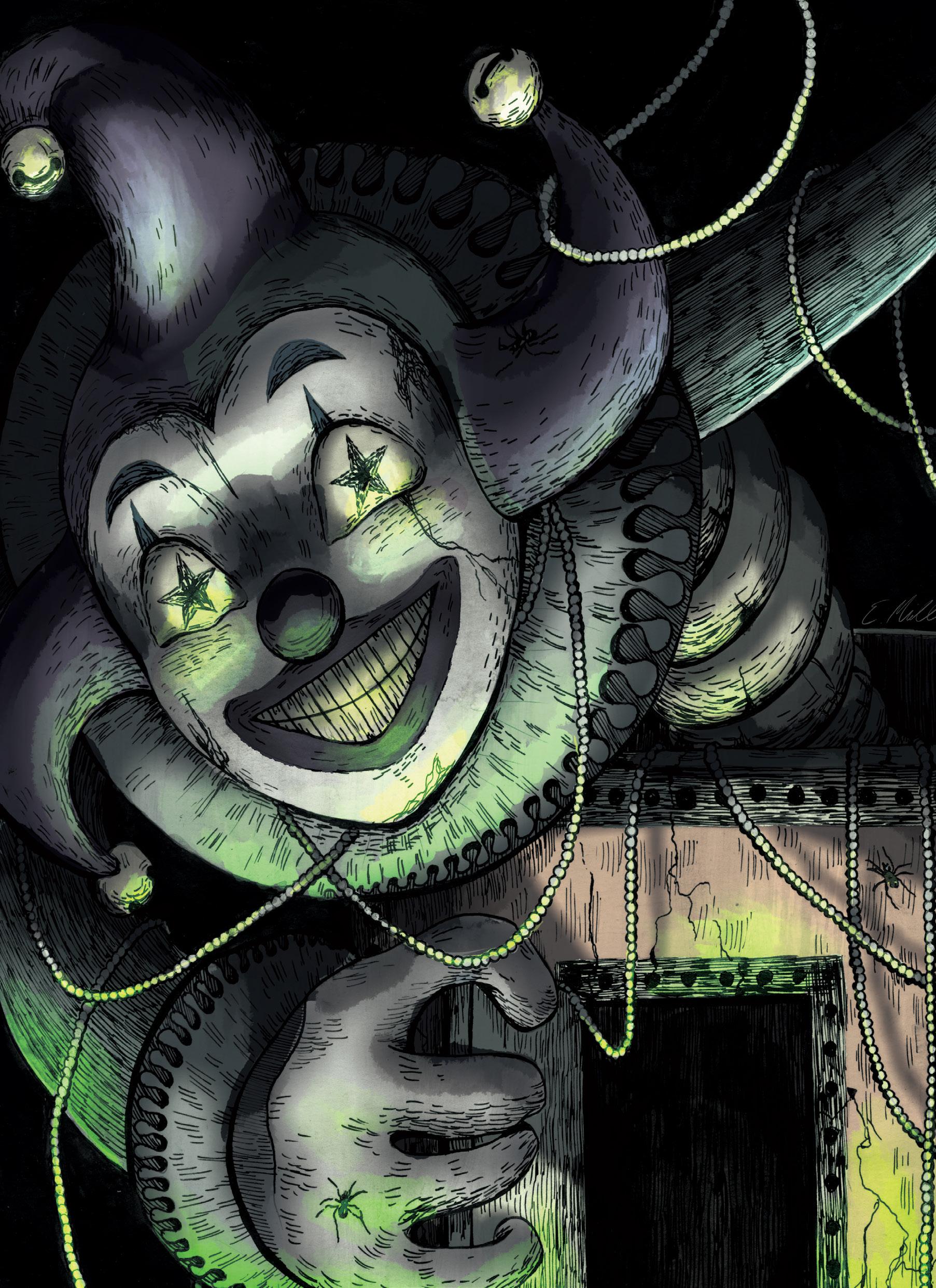
Ode to the Halloween Monster
by Stella Gleitsman
To say she is a monster to say you are monstrous too a scream queen lost and flailing, scalp torn from her gloried head, lipstick strewn around her neck a golden noose a type of daydream that gets you so caught a witch, legs stiffened by rage by one too many trespassing hand the town monster, leavening his tongue on everything swallowing hamlets whole
I drink my swill, I love its horrid taste mixed peasant tears
I writhe on my tombstoned hill, I leech on your Catholic nightmares
I think of vampires as the transient people, all ghouls and fiends transients, displaced, the thread of their dirty ancestry pulling and pilling, a ragged scarf all barbarian bones buried in one birthing, unmarked grave
93 | Issue 7
candle lit, hooked nose goblin, in the back corner of my brain, I hear a rattling, leaving me to wonder, if all of this is one long memory of every person ever devoured estrie, demon woman of the Talmud eats your babies, metastasizes onto you, a succubus looking for a warm bed and her hair falls like so layering me with snakes, letting me rest on her gut, opening me up, turning me soft, I’m so that I fall in line demon / savage / brute / wretch / to be casted in holy horror, to carry yourself home anyway
Winter | 94

Old Soul
by Jacqueline Morgan
Existential Crisis, Day One
Sentiment (noun)
1. An attitude, thought, or judgment prompted by feeling
2. Refined feeling: delicate sensibility especially as expressed in a work of art
See also: emotional idealism, a romantic or nostalgic feeling verging on sentimentality
Good lord. There I go, opening with a dictionary definition. What is this, a high school English paper? I can’t let my professors catch wind of this. But really, what’s a girl to do? I love words, especially when they capture the nuance of a feeling I thought I was the only one experiencing.
Sentiment. Emotional idealism. Nostalgic. Romantic. I’ve always thought of myself as “romantic” with a capital “R.” Not in the “I believe in love” way, but in the Lord Byron, bawling-while-watching-Old-Hollywood-movies-because-I’m-cheesy way. I’d rather experience all of life’s colors – the wistfulness paired with the warmth – than be “just happy” or “just sad.”
Why have I got sentiment on the brain? I had a rather alarming incident happen to me the other day, when I brought my cousin to the mall. In a desperate attempt to seem cool, I took her to Forever 21 to try on a pair of low-rise jeans she’d been eyeing. For many of us, simply saying the words “low-rise jeans” is horrific and climactic enough, but this is only just the beginning.
The store was exactly how I remembered it from high school: clothes strewn all over the dressing rooms and under sales racks, a pop singer wailing on the speakers. The 90s were making a comeback, I noted, observing a rack of oversized Nirvana tees and neon color block windbreakers. I scritched my fingers along a few of those jackets, chuckling drolly to myself. I was a fan of vintage fashion, too, though I tended to go for gingham dresses and low-heeled ankle boots, more 50s and 60s fare.
How could I fault this fast-fashion conglomerate for dipping a little into the past?
Winter | 96
That’s when I saw it. Directly ahead of me, shining a sickly yellow under the fluorescent lights: a display with the words Y2K nostalgia.
Seriously? Y2K? I’d yelped.
My cousin rolled her eyes good-naturedly, said something about those styles being “classic.” How things seemed so much simpler in those days; how she’d heard on TikTok that families used to have “computer rooms” rather than smartphones. How music wasn’t the same anymore, now that groups like NSYNC and Destiny’s Child weren’t writing songs. She had a far-off, misty look in her eyes; I was sure I’d become the target of some cosmic joke.
If you’d said the 50s or 60s, I’d forgive you. But the early 2000s?
My cousin snorted derisively. Sounds like Grandma needs to get back to the nursing home.
Awful, simply awful. I’m trying to place myself in her shoes, I really am, but emotional idealism over Juicy Couture tube tops and denim on denim is where I draw the line.
Existential Crisis, Day Two
A vision from my early-2000s upbringing came to me yesterday. It was the first day of seventh grade, so this would have been 2007. I sat in a circle of desks in Ms. Muir’s geography class, tapping my blindingly white Skechers against the linoleum. The class was being told to zip it, so we could get on with our “getting to know you” segment.
I don’t think I’ve ever not panicked during the “getting to know you” portion of an event. For someone so much in my head, I was, and still am, painfully obtuse to what makes me interesting.
Ida, a girl with tidy French braids and an even more impeccable side eye, sat across from me in the circle. She shared something about her family owning a lake house, and then called on me, her eyes gleaming, catlike. I squeezed in one last internal panic and said the first thing that came to mind:
I rarely live in the present. I love old movies, books, and TV shows.
Now, the way I phrased it probably sounded pretentious, especially for a thirteen year old. But surely that was no excuse for the way Ida laughed. Just threw her head back and straight up cackled. Well, damn, Ida. It’s because I’m so hoighty-toighty that I’m not stooping to your level and saying your name sounds like a farm girl. I’m the most poised kid in this joint.
97 | Issue 7
That’s not to say Ida caused me irreparable trauma. There are always obnoxious little shits like this in middle school. But hey, I’m sensitive! Or rather, sentimental. I love being the weird girl, but it’s hard not to feel a bit apart from others sometimes.
Existential Crisis, Day Three
Okay, turns out I’m brooding over the Forever 21 incident. Those Y2K-inspired threads are popping up everywhere. Target, even high-end department stores. I mean, seriously, Macy’s, you’re better than this. I keep imagining their key demographic – Gen Z-ers who aren’t that much younger than me, yearning for an era they imagine to be simpler. With each slang reference or viral dance craze I don’t get, the canyon between our generations will shudder and grow wider. Soon it’ll be a gaping maw. The thing with the Y2K boom, though, is that those styles all feel so trendy now. I’ve never felt trendy, in any of my iterations of yearning for the past. But where is my holier-than-thou attitude coming from? Do I want every kid to feel like an outcast, like me? Am I making myself a martyr and just a little bit proud of it?
Existential Crisis, Day Four
Found another great word for my opener. Or rather, a phrase: mono no aware. A Japanese idiom that honors life’s impermanence. That beauty, while fleeting, is still beautiful. What can I say? I’m an optimist at heart.
Day Four, Again
Not only am I an optimist, but I’m painfully earnest sometimes. I want shows that don’t rely so heavily on ironic humor, like today’s ones do. I want Gene Kelly, tap dancing his heart out for three straight minutes with no cuts and no CGI. I want music that tugs on my heartstrings like a Dean Martin ballad. I want something hokey. I want something real.
And Again
A confession: Even when I’m aware of life’s ephemeral nature, it’s often tinged with panic. During a particularly good moment in life I’ll be
Winter | 98
thinking, I’d better cherish this moment now because it’ll soon be gone, or I love that I’m still young, but I’m also so much older than I was five years ago. I want to be someone who looks back and says, “that moment really was as good as I remember it.” But damn, if that ain’t easier said than done.
Existential Crisis, Day Five
If I don’t feel at home in the present day, then where do I belong?
How can I find comfort and community in the present while still staying true to myself?
Existential Crisis, Day Six
You know who really gets it? Winona Ryder’s character in Beetlejuice. “I myself am strange and unusual.” It’s contradictory, but I’m comfortable with the foreign and the strange. Overthinking and oversensitive about it, sure, but for the most part, fine.
You go, Winona. A figurehead for weird girls everywhere.
Existential Crisis, Day Seven
I’m turning thirty soon. Can you believe it? THIRTY. Not me, surely, the little twerp who felt so superior in Ms. Muir’s class way back when.
This, in addition to having a soul-sucking corporate job that’s nothing like the publishing gig I dreamed of, has me reminiscing about my youth. I know what you’re thinking: Jackie, stop it! You already know how this works! The past is not inherently better than the present! Well, gosh, I know it, but old habits die hard. Time is passing so quickly, and I need to get my escapism fix somehow. I haven’t had the chance to wander aimlessly through an antique shop in weeks.
It’s much easier to romanticize the past when those times are static. When you can dilute certain eras down to their pop culture staples and ignore their harsher realities out of comfort and privilege. It’s far simpler to pull up my big band playlists than to watch the days fly by in the present, or listen to my internal monologue, chanting, your window will soon close, any dreams of happiness or belonging you had for yourself are growing
99 | Issue 7
increasingly slim.
This is sounding an awful lot like an existential crisis, no? Well, I warned you up top, what did you expect?
Existential Crisis, Day Eight
There’s hope for me yet. A friend recommended me for an editorial assistant gig, and my last Tinder date seemed really interested in my passion for Old Hollywood. Opportunities are still out there, and even if people don’t get me at first, those who matter will endeavor to understand.
My cousin sent me a TikTok earlier today (because of course she did, the whippersnapper) through Facebook messenger (I still refuse to get TikTok). It was some forgettable piece of content, something along the lines of “The Zodiac Signs as 50s Trends,” but what struck me was the “thought of u <3” soon after. I’ll admit, I was absurdly charmed by the gesture, my cousin remembering this small fact about me. God, maybe I really am getting old. Or if not old, sentimental as hell, but you already knew that.
Work’s been slow today, but at least my new pair of gogo boots has me in a sunnier mindset. They’re electric blue, because there’s no way you can own gogo boots in a sad neutral color. Vegan leather, rush-ordered online. Read that last sentence again. Sometimes living in 2023 can be quite beautiful.
Did that sound contradictory, coming from me? Fair enough. I’m a beautiful mess of contradictions. Strange and unusual. Something hokey. Something real.
Winter | 100

FORE! Kathryn Rossetter
CAST IN ORDER OF APPEARANCE
Jane - F- mid 60's housewife - the middle child
Jonathan - M - late 50's - actor - Gay - the baby
Jack - M - 70 - retired, stable - the first born
This is a Family Story. ANY ethnicity for the family. The siblings are all from the same biological parents.
Time - Current from 2015 onward
Place - Anywhere USA
AT RISE:
Anywhere America. Afternoon. A large dining table and chairs center stage. Off to the side a a fully stocked bar cart.
O/S voices heard bickering. JANE, mid 60’s enters carrying a large Golf ball inscribed with “Fairway To Heaven” and two crossed golf clubs beneath it. JONATHAN, late 50’s hurries in behind her.
JONATHAN
We’re not burying Dad in a golf ball!
JANE
Yes, we are. He would have loved the idea.
JONATHAN
Cremating him before I got to say good-bye was bad enough, and now this.
JANE
He was dead. Too late for good-byes. You should have gotten here sooner.
JONATHAN
I was on location.
Your excuse for everything.
JANE
JONATHAN
I apologize for needing to work and not just stay home living off my wealthy,
Winter | 102
entitled spouse.
His name is Frank.
Frank.
And I worked for years.
Where is Saint Frank?
JANE
JONATHAN
JANE
JONATHAN
JANE
At the nursing home closing out the account. Want to join him and contribute to the bill?
JONATHAN
And co-op your martyrdom. Not a chance. Where the hell did you even find a golf ball urn?
JANE
Amazon.
JONATHAN
This is making a mockery of his life and his death.
JANE
As per his instructions. Quick cremation, small service, quick burial.
JONATHAN
Still no mention of a golfball.
He suggested a coffee can.
JANE
JONATHAN
That was his humor. He didn’t mean it and would never want his burial to be joke.
JANE
You have no idea what he wanted. If you had ever bothered to visit him the last few months, you could have asked him yourself.
103 | Issue 7
We face-timed.
JONATHAN
JANE
He wanted you in person. To hold your hand. Talk in private. Instead, I’m sitting there helping him. I heard every word.
JONATHAN
Judging every syllable, too.
JANE
He said how proud he was of you. You barely said anything back.
JONATHAN
Cuz you were there.
I was holding the phone!
JANE
Overhearing as he enters is JACK, early 70’s carrying a box that he sets on the table.
JACK
Hold the phone. John, has finally made it. What’s up?
JANE
Nothing important. (Referring to the box.) Is that it?
JACK
Yup. Dad in a box.
Ewe. Are the ashes just loose in there?
JANE
JACK
No, they’re in a thick plastic bag.
That’s harsh.
JONATHAN
JANE
Your entire life reduced to a plastic bag in a box. So you see, Jonathan. A golf ball is an upgrade.
JONATHAN
What do you think of the golf ball urn, Jack?
Winter | 104
I think it’s hilarious.
It’s offensive and embarrassing.
JACK
JONATHAN
JACK
So you care more about what other people think than what would make him happy?
JONATHAN
Regardless of our differences and how I disappointed him I want his burial to be dignified and respectful.
JANE
You didn’t disappoint him.
JONATHAN
When I came out to him, he took 3 weeks to respond.
JANE
Cut him a break. He needed time to process. And you drunkenly told him at Mom’s wake.
JACK
She’s right. Your timing sucked. And he was way more concerned about your choice to be an actor. He never understood that for sure. No financial stability.
JANE
And he was much more accepting of you and all your fly-by-night boyfriends than he ever was of any of mine.
JONATHAN
Maybe because Frank is/ Cutting him off
JACK
/Knock it off. We’re here to bury Dad, not pick at old wounds.
JONATHAN
All right then, bury him, but not in a golf ball.
JANE
He loved golf!
JONATHAN
It was just an excuse to get away from the family.
105 | Issue 7
JANE
I thought it was the 19th hole. He always came home tipsy.
JONATHAN
And then yelled at one of us. Usually me.
JACK
You’re not special, John. We all equally shared in his wrath. He loved us. He just wasn’t great at showing it. Have you learned nothing in your years of therapy, John?
JONATHAN
Yes, I learned boundaries and how to take care of myself in regard to him.
JANE
Which included hardly ever calling or coming to visit. Leaving me to be the caregiver.
JONATHAN
Climb down off the cross, Jane. We need the wood.
JANE
Shut-up
No, you shut up.
JONATHAN
JACK
Both of you shut-up. What are you, 10?
JANE
(Pause.) I had the day to day, Jack. Neither one of you were around much. I’m not a martyr, I’m just stating the facts.
Silence.
JACK
I’m sorry, Jane. You’re right. We could have done more. You did the heavy lifting.
JANE
Me and Frank, who never gets any credit.
Jack glares at Jonathan.
Winter | 106
JONATHAN
Alright. Yes, you and Frank took good care of him. Sorry. But it still doesn’t give you the right to dictate the urn.
JANE
Golf was more than a game, John.
JONATHAN
What was it then? Why was it his great love?
JACK
Did you ever think to ask him? (Silence.) I did.
JONATHAN And?
JACK
He said it was a game you only ever played against yourself. It challenged you physically, but more importantly, it challenged you mentally and emotionally. It’s a game you can never master. Just like life. He looked forward to each round. He thought it’s lessons made him a better man.
JONATHAN
That’s debatable.
JANE
If you hate him so much why care what urn he’s in?
JONATHAN
I don’t hate him. I just couldn’t reach him.
JACK
As he got older, he said golf was a reason to keep going because the quest represented hope.
JONATHAN
He said that? He actually said quest and hope?
JACK
Yes. He said a lot of things as he got closer to the end.
JANE
I once asked him what the best day of his life was. He said when mom said she’d marry him. Then I asked him the most affecting event in his life and without hesitation he said WWII. Finally, I asked him, if he had one most memorable life moment. He took some time, stared off, and finally said, “getting his hole in one.”
107 | Issue 7
JONATHAN
So not the birth of his kids or grand kids or anything like that.
JACK
Dad was not a Hallmark movie, John.
JANE
Do you remember that day?
Not really.
JONATHAN
JACK
You were probably too young. Dad came home with champagne and flowers and it was like winning a billion dollar lottery. He gave me the ball to hold and said, feel it Jack, can you feel the energy? The life? I had no idea what he meant.
JANE
Think about it. Getting a hole in one was true mastery. And he did it. He hadn’t hurt anyone, or disappointed anyone. His mind and body were in perfect synch. He drove the ball. It went in the hole. An easy, peaceful execution. For that single moment, he had mastered his demons and his life and it was perfect. How many of us ever get to feel that?
JACK
Maybe elite athletes. Like in the zone? But just an ordinary working stiff. I don’t know. Not me.
JANE
I can’t even imagine it.
JONATHAN
I’ve almost had that moment on stage.
JACK
Well then you’re lucky. And maybe if you’d ever tried to tell him that, he might have understood your choice of profession.
JONATHAN
Easier said than done.
JANE
Maybe, but you are lucky, Jonathan. You’re more like him than you realize.
JACK
He tried to share it with me. Mom got him those tickets to one of the practice rounds at the Masters. He wanted me to go with him but I turned him down. I
Winter | 108
don’t even remember why.
JONATHAN
I had play practice so I turned him down, too.
JANE
I never knew that. He never even asked me. I guess cuz I was a girl. He wanted boy bonding.
JONATHAN
He want alone. When he got home, he just sat in his den nursing a beer. I figured he was pissed off.
JANE
We’ll never know.
JACK
(Pause.) I could use a drink. Anyone else.
JANE
Absolutely!
Ditto.
JONATHAN
Jack crosses to the bar area, preparing three small glasses of Whisky.
JANE
Dad tried bonding with me one Christmas. He took me to his course and just dropped balls in the fairway to smack them around cuz the course was closed. I hit one nice and straight and he applauded. But the next one went far to the left and bounced off a parked car. I was mortified and said, “should we leave a note?” He started laughing and said, “ No Note. Get in the cart, get in the cart”. And then we fled the scene of the crime and rounded the bend to the next hole. He swore me to secrecy and said, “you park next to a fairway, you take your chances. I’ve had two windshields broken on my cars over the years.”
Her brothers chuckle.
JACK
Now that’s the old man I know. Mom sent us out for corn when I was 10 and instead of buying it, he stopped by a corn field. He dragged me along and showed me which ears to pick and why. We stole a dozen, ran back to the car and hauled ass. He seemed very proud of that adventure. And I was sworn to secrecy.
JONATHAN
He showed me how to hot wire a car in case I ever needed to get out of Manhat-
109 | Issue 7
tan in a hurry. A skill I’ve never used, but he also swore me to secrecy.
They all chuckle.
JANE
I over heard him talking to his favorite hospice nurse, Paul. Paul asked him if there was anything left that he wanted to do in this life. After a bit Dad said, “play just one more round of golf.”
Silence.
JACK
One last try to find that moment.
Hoping he’d done well.
(Pause.) OK. Golf ball it is.
Yes!!!
JANE
Jane and Jack look at Jonathan.
JONATHAN
JANE
Jack comes over with the drinks. Places them on the table and opens the box. Carefully they pour the ashes into the urn.
JONATHAN
(Referring to the ashes.) Jeez. It’s like he’s become a sand trap.
JACK
Don’t make me laugh or I’ll spill him.
JANE
Should we put a tee in there, too?
Her brothers stare at her.
JANE
Too much?
Yes.
JACK & JONATHAN
Ok. But oh, I have another idea.
JANE
She runs off stage. The guys finish putting
Winter | 110
Perfect!
A toast!
him in and securing the top back onto the golf ball.
Jane re-enters with his favorite Golfing Baseball cap. She gently places it on top of the ball.
JANE
JACK
They each take a glass.
JACK
Dad, to your final master stroke. A hole in one for eternity!
They clink glasses and down their drinks. Light begin to fade until just the golf ball is in a spotlight.
JANE, JACK & JONATHAN FORE!
Black Out.
END OF PLAY
111 | Issue 7
Winter | 112



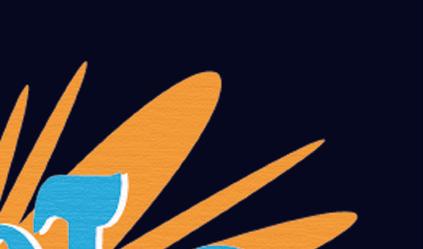

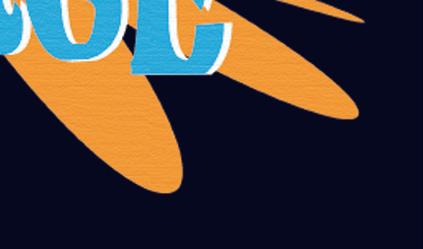
113 | Issue 7 Chaoticmergemagazine.com Copyright © 2024 by Chaotic Merge Magazine














































